February 17th, 1979. The Clash's 'Pearl Harbour '79' Tour of North America review by Sylvie Simmons for SOUNDS music mag with pics by Bob Gruen. "For the first time in the US I could see the relevance of pogoing"
A detailed account of The Clash's first American tour in 1979, documenting their performances in San Francisco and Los Angeles, highlighting their punk rock energy and ambition to transform the rock music landscape.
The article captures the band's raw performances, audience reactions, and their determination to challenge the existing music scene, with Joe Strummer and the band seeking to defeat apathy in rock and become the world's best rock and roll band.
The paper looks like the dead sea scrolls, so I can't read it. But I do remember the assignment: go see the Clash's show at the Santa Monica Civic (that was back when I was living in L.A) then, after the show, get on the bus with them and overnight to San Francisco to interview them and see them play there.
I distinctly remember Joe being a bit pissed off - not with anyone in particular, unless it was someone from the record co; he just didn't seem happy being in the US - and heading straight to the back of the bus with Paul and staying there all night. Topper seemed happy - before Joe arrived, he was being entertained by an adoring young lady fan - and Mick was a sweetheart. I remember him talking about American bands he loved and wanting to go around all the record shops.
If anyone has better eyesight than mine they can confirm or deny if any of this made it into the piece. PS. I loved The Clash. Everything about them. The music, the ethics and ideals, the lot. Still do. In fact I'll go put on one of their albums right now.
Page 8 SOUNDS February 17, 1979
Jaws
The Clash in America
Euphoric scenes of wild abandon, the belated explosion of punk consciousness etc etc
"So you think we've lost the battle - then go home and weep about it. Sometimes you've got to wake up in the morning and think, 'Fuck it you're going to win the battle.'" - Joe Strummer.
There were no riots, no outraged citizens, no glaring headlines when Pearl Harbour '79 came to an old elegant building in downtown Vancouver last week. The only report in the music section of the newspapers was that the local symphony orchestra had gone on strike. The Clash's first American tour is being felt by the press as the stimulating aftershock of the Pistols' US invasion a year ago or not at all.
Berkeley Community Theatre in San Francisco
The Pearl Harbour '79 tour posters depict the Statue of Liberty bundled up in rope. A more telling picture could have been taken outside the Berkeley Community Theatre in San Francisco a few days and a long bus ride later. An hour before the doors were due to open a line of people stretched quietly from the front steps in a perfect shape of a walking stick, where two young security guards shone torches on the few rebels who wanted to hang out rather than wait in the queue for their numbered seats. There was something numbing about that picture. US rock.
Maybe these were the Bo Diddley fans. The middle aged usher who showed me to my seat felt the need to tell me who he was. He stood up there with his square guitar and growled like it was 1965 all over again and almost everyone cheered and gave him standing ovations. The difference between a living legend and a living band I thought to myself when Diddley left the stage, and the hired DJ they brought over for the tour played Buzzcocks, and Sid's 'My Way'. You stood up because you simply had to. There's simply nowhere else for all that passion to go. The best rock music someone once said is like a good whore, it's both aggressive and relieving. I didn't get any of that from Bo Diddley's macho strutting. The Clash supplied an overdose.
The audience was divided into factions: the delirious converts who made the most of The Clash's rule that the bouncers weren't to force people into their seats, flooded the front section and pogoed madly.
Towards the back the typical US rock fans observed the action at a distance through binoculars (imagine the only place you'd ever seen your favourite band play is half a mile from the stage in a place like Earls Court - out here it's as inevitable in rock as death and taxes are in life) and an even more staid bunch sat in the balcony, I suspect they were the ones queueing quietly outside to guarantee a safe spot for their voyeurism.
There were a fair number of old style bondage and safety pin punks - remember nothing has happened on this scene since the Pistols gig in Winterland at the end of '77. Now the Pistols are dead, Sid's dead, Winterland's dead and San Francisco is still the Grateful Dead. The Clash have got a lot of reviving to do.
There were a lot more Ramones lookalikes, stormtroopers in sneakers with elaborate punk badges, a couple of miniature Sun front page headlines "I want justice for my Sid" and a large crowd of US music press analysing the action like it was the interval of a Bernard Shaw play complaining that they couldn't make out the words when Joe Strummer called from the stage "If you can't understand the words, don't worry, you're not alone."
We were thanked for bothering to come tonight. Bothering? It was magnificent. Though I could see little more than the flag used as backdrop and Jones' and Simenon's elevated leaps above head level, all rock and roll senses were gratified. Contact with hot pogoing bodies, smell of overheated energy (something you forget is sanitised for your protection in sports arena rock gigs) and the sound; a brain battering 'Tommy Gun', an exhilarating 'Stay Free', a scorching 'Guns On The Roof', 'I Fought The Law', 'Cell Block No. 9' and the hardest, fastest, most powerful encore in rock with 'White Riot'.
As for the audience reaction, some seemed to feel uncomfortable but more felt salvation. I can't remember having seen a performance so shot with adrenalin, outdone though it would be by the next night's show.
BACKSTAGE there wasn't much talking. In the five days the band spent in San Francisco they must have talked to just about everyone who wanted to listen. A press conference on Monday with a barrage of dumb questions led the band to turn it into their own personal comedy show: record store appearances, radio interviews and private viewing with anything from "Time" magazine to Cashbox.
Filllmore
In the dressing room someone asked Mick if he liked the Jam (to a suitably non-committal answer) and someone else warily suggested that Clash had some sort of pact going with Elvis Costello (whose tour bus was parked in Japan town near the next night's gig) who was going to have old rocker Carl Perkins on his tour (Perkins in fact backed out a while ago), only to be told politely that if anyone was copying it was Elvis, who doesn't seem that popular with Clash. Mick and I swapped notes on what a strange place this is. Tomorrow night's gig hasn't exactly left their record company brimming with philanthropic joy. It's a benefit concert for 'New Youth', a fledgling organisation aiming to keep ticket prices down, get larger percentages for the bands and a place for new wave acts to play.
Besides not being part of the official tour and bound to upset the promoters (they got around any legal hassles by advertising 'White Riot in the Fillmore' with the band's name never mentioned), the tickets are half the price of the Berkeley gig, the venue seatless and flooded with atmosphere. Of the eight dates on this mini-tour (the band intends to return in June and fill in the gaps) only one failed to sell out - the Berkeley one. A good sign considering the size of the venue (the only time the Pistols played to anything in the few thousand seat mark over here was at Winterland).
The following afternoon I head for the Villa Roma bar to find Ace, the tour manager locked in a verbal battle with the red-faced vein-popping Motel manager. A misunderstanding over a phone bill that would have evoked polite discussion at the most with the average guest. "The man's an arsehole" Mick told me by way of explanation. The manager had parked his station wagon (one of the smallest American cars) in front of the tour bus to stop it leaving, and was threatening to call the police.
Ace was trying valiantly to keep his temper - not easy when a middle aged man screams "You bums, you freaks" to your face. The band left and the manager swaggered over to the bar, loosened his collar and had the barmaid get him a double, boasting how he "wasn't going to be taken for a ride by the likes of those freaks" and how "I blocked the bus with my little Pinto wagon - it couldn't move". A hero for a day.
The benefit concert was in a moth-eaten synagogue in San Francisco next door to Jim Jones' People's Temple, tacky but majestic, and a great venue. The punters were generally shit-stoned, dribbling in, falling over, dancing with strangers and having fun. There was a strong wired sexual sort of atmosphere here, an intangible kind of craziness, The thing that attracted you to rock and roll in the first place.
There was some trouble in the line, a few bottles broken, but that's all, mostly brought on by the slowness with which they were let in. This was 'New Youth's first gig and they hadn't quite got it together. They only opened one cash register until Clash's manager threatened to open the doors and let everyone in free and tills appeared like magic.
Clash were electrifying. Like a bloody great headline, commanding attention and belief. They opened with 'I'm So Bored with the USA' and the punters went as wild as I've ever seen them go. No time to take notes there were more important things to do. For the first time in the USA I could see the relevance of pogoing - when there's no space and powder down the front and you want to dance, there's nowhere to go but up. It's also a pretty efficient way of meeting people when you fall on top of them. One girl danced from someone's head onto the stage and dived off head first into the solid mass of people. That must be just about the ultimate rock fan experience.
America was getting off on the Clash and New Youth was getting a good down payment for their organisation. Some hope yet. But the battle's not won. Johnny Walker the DJ was there. He's just been fired by a San Francisco radio station for playing punk records.
ON THE BUS after the show, Jones, Strummer and Simenon are conducting a private post mortem on the tour in the back. Verdict: pretty good, Berkeley OK, the benefit in Frisco, the best so far. Topper and a friend and the rest of us are down the front watching 'Heaven Can Wait' while fans mill around outside.
February 17, 1979 SOUNDS Page 9
Santa Monica Civic
Just before the gig started, Topper was sitting on the bus watching 'Star Wars' when a guy came inside and struck up a conversation and took a lot of persuading to leave. He came back a few minutes later with a bottle of champagne, shook the drummer's hand and left. The champagne was consumed on the 400 mile trip to LA. Everyone is half dead by the time the bus reaches Santa Monica. While Ace is sorting out a beach front hotel, an old man wanders up and asks if he thinks we're wandering Bohemians until the driver tells him it's a rock band that's playing the Civic tonight. Undeterred the 70 year-old announces that he and his wife go disco dancing every fourth night. The bus breaks out in smiles. "All you've got to do is get in there and do your own thing, feel the beat" he tells us knackered looking bunch of youngsters. No-one offers him tickets for tonight's gig.
Los Angeles is less Bohemian than San Francisco. LA is big streets, big cars, big billboards and big money. In LA anything that doesn't make a big profit is considered neither art nor desirable. Little bands are pretty much banging heads against the brick wall. The so-called 'new wave' scene is barely holding its own. That Clash sold out the 3,000 capacity Santa Monica Civic is a good sign, even if the numbers were padded out by press and posers and probably members of every quasi-punk band in town.
It was a good show, but not a great one. Though that's not to say that this wasn't one of the best evenings I've spent in this venue. As always here the sound was flat, but the spirit and strength of the music and the wildly vibrating floor from the frantic pogoing as good as compensated. The crowd was pretty manic tonight.
Kamikaze punks made exultant swallow dives into the audience from the stage and the editor of 'Slash' fanzine leapt up to join Strummer in an unofficial duet before being dragged off and according to him, roughed up by the bouncers who seemed for the most part very easy going for the States.
As Mick said: "We do as much as we can, we try to say to the guys, let them stand up, don't bash them, and if we're the headliners they've got to take some notice of us." So they've bought quite a big crew with them but they don't know all the security guards, Joe said, and was pretty pissed off when the guy from Slash kept on whining about his battle scars.
"We never said it was a utopia. Rock and roll is played on enemy ground. We never promised you when you were a baby that it was going to be roses all the way. But we stopped more than you can imagine. You can go on about getting the shit kicked out of you and you can go on about that guy being murdered by bouncers in London, you can go on as much as you like and I'll just sit here and listen and I'll be thinking of the times I've stopped the blood when I had the chance to."
There was a press conference at midnight after the show, rather a depressed concert as Mick described it. The band were in a lousy mood. No explanation. Mick told me it has just been a 'strange day'. They seemed pissed off with the way the record company was handling them, especially with the Statue of Liberty posters.
"If they're going to have ads and buy big space and show how flashy we are" said Joe "We're going to pack information into it such as the lyrics". As in the epic 'Don't know what to do with us, they're fucking us up". So what should they do? "Leave us alone for a start".
Cleveland Ohio
And they're understandably worn out after the 10 hour bus ride from San Francisco. In seven hours time they'll be back on the bus again heading for Cleveland Ohio. Some people at the record company were privately expressing anxiety about letting the band drive halfway cross country. They might decide not to arrive at the right place and the right time.
But they spent 20 minutes slouched over a table backstage (except when Topper got up to let in the members of the Germs, an LA girl band who were pummelling on the windows outside). Opposite 10 rows of assorted scribes giving half hearted answers to questions; will they fill in the gap left by the Sex Pistols?
Joe: "I don't know. I haven't seen the gap yet." Will they ever release their first album here? (the record company thought the material and presentation too crude for US radio's present AM or FM programmes, and with no hope of a hit on their hands, didn't bother to put it out)
Joe: "We might release it sometime as a historical document, a greatest hits album":
Do they have problems being famous? Paul: "We can walk down the street in London, people recognise us and come up to us. It's like having loads of friends. That's the way we live, we don't even think about it."
We learn they came here as soon as they could, touring the odd places at home was getting tedious. that they found what they consider a healthy new wave scene everywhere they've been so far, that they intend to come back and finish off the job here in the Summer of however much flogging it takes them to make it, and that their ambitions are to do away with Boston, Kansas, Foreigner and Kiss as quickly as possible and become 'the best rock and roll band in the world'.
If Pearl Harbour '79 continues its electrifying attack, they're going to succeed on both fronts. When it comes down to it, the battle is not tying the Statue of Liberty with rope, nor about the right to wear your safety pins, Fiorucci jeans and prawn silk shirts without protest from your Mum.
It's about defeating apathy in rock, changing its direction and taking over its future. And if that's too much to hope for, all who have seen this tour must agree that they're halting senility for a while.
SYLVIE SIMMONS
(2)
Jaws including an article on The Clash in America by Sylvie Simmons and Pic by Bob Gruen. "Clash were electrifying. Like a bloody great headline, commanding attention and belief."
The Clash's 1979 American tour, dubbed "Pearl Harbour '79," showcased the band's electrifying performances and growing influence on the US punk scene. The article details their shows in Vancouver, San Francisco, and Los Angeles, highlighting the band's impact on audiences and their struggles with record company expectations.
Page 44
CLASH: David Lawrenson meets Topper and Mick, alias Headon and Jones
"We're musicians"
I'm so surprised to be asked to do this sort of thing, because only "I lately have I realised that people think we properly play and stuff." So speaks Mick Jones, lead guitarist with the Clash.
He was genuinely surprised that a publication like International Musician and its readers would be interested in the way he plays his instrument. The fact is that he is a member of one of the most potent and exciting bands in the country.
To some people in the rock business, the term "musician" is reserved for players who have been around a long time, amassed a huge collection of instruments or who take endless long solos. Because all these criteria are largely absent from the New Wave, the implication is that it's scene devoid of musicians.
Luckily this narrow outlook is not universal. If it was we would have had no Beatles, Stones or the Who. Rock music is primarily concerned with expressing feelings, emotions and excitement qualities which the New Wave has in abundance.
Along with the Sex Pistols and the Damned, the Clash were one of the original punk bands formed in 1976. Now the sole surviving outfit from that trio, their music still contains much of the anger and aggression of those early days, although they possess a style and an awareness that sets them apart from many imitators.
With a minimum of TV and radio expsoure, their singles have consistently made the lower reaches of the charts, while their first CBS album "The Clash", released in early 1977, went straight in at number 12 and has sold consistently ever since. It has taken them almost 18 months to come up with a follow-up, "Give 'Em Enough Rope", which saw them working with American producer Sandy Pearlman.
Mick Jones is 23. He started playing guitar at 16, having tried his hand at drums and bass. He blew a week's wages on a big blond F-hole Hofner acoustic which he used to mike up. "Then I got a Telecaster, a great old map neck Tele, but I always wanted a Les Paul Junior.
"I thought they were the greatest guitars going because I'd heard both Steve Hunter and the other guitarist on the Lou Reed live album used them and I thought, 'This is what it's all about'. So I saved up for about six months and got one. It was really difficult to find, because there were none in the shops. Eventually I found one in the Vox shop in Shaftesbury Avenue. It was on a top shelf and really dusty. It was a cherry one and I paid about £190 for it. It has been broken about four times, so it has
more or less died but I've got a couple of others now.
"The guitar I'm using now is a 1952 Les Paul Standard, which got broken in Arnheim by the stage manager. It was on a guitar stand and he walked straight into it and the neck was off. I had a bit of respect for that guitar it was older than I was! I got it fixed but it's not the same, it doesn't tune up and sustain goes. As a spare I use a Les Paul Junior: I've got a blue sparkly one and a red one. I think there are some guitars that do talk to you, you feel OK with them. If you feel good with them then they are great guitars."
Mick has very definite ideas on guitars and the way they should be treated and played. He is a firm believer in the quality instruments made by top manufacturers such as Gibson, dismissing many of the newer makes as merely "copies", "I didn't buy them when I had no money, so I'm not going to buy them now," he proclaims.
For amplification he uses a Boogie set-up. "I was using Ampeg for ages because the Stones used them, but now I've got a Boogie and it's really great, the best. I use one of those big ones with a graphic on it. If we are playing a really big hall I use a slave of a Marshall and a couple of 4 x 12s, otherwise it's just the Boogie and 4 x 12s. They're good amps except the speakers blow, but that's only because I turn it up to
10. I've got no self-control whatsoever. "The only effect I use is an MXR phaser, it's American one, the biggest they have. You can get about five different. phases on it. We have Space Echo and that kind of stuff through the PA, and I used a wah-wah on one of the album tracks."
To many, the music of the Clash would seem crude and regressive, with guitarists. such as Mick Jones definitely not qualifying as "musicians". Yet those same people would undoubtedly extol the expertise of the Stones the Who bands who definitely were not considered top quality musicians in their early days. It is impossible not to draw comparisons between the early
Sixties and today's New Wave scene. "It's probably just the same," says
Mick, "but it is a pity that all those people forgot about it, and forgot it was said about them. The point about our music is the spirit of the thing. You have got to communicate the spirit of what you do. When you do that, you can't really spend a lot of time respecting traditional values of what music is all about.
"I think it's nothing to do with what guitar you use, it's how you do it. I think you can do it on a Woolworth's guitar, quite truthfully. The important thing hing is how. Guitars are there to be used, it's a tool, you shouldn't let it play you or be your boss. Some groups you see and you say, 'Oh, the guitarist needs a good sound, he's got a tinny sound and it doesn't quite fit the music. But really, it's only a matter of once you've got the thing that fits the music, doing it with a bit of style.
"There's lots of guitarists I really like. I think Mick Ronson's great, Keith Richard don't do much and I think he's pretty good, Jeff Beck does a lot and does nothing at the same time. There's loads of them I I really like and I've got nothing against these people. I've only got something against those who .. well, the only spirit they communicate is just taking the audience's money and giving them nothing for it the groups with their heads in the sand."
Mick admits that he is still learning and that the group are still practising and learning their craft. The biggest problem seems to be one of dynamics, in particular learning to turn down on stage so the vocals can be
heard. Mick writes most of the band's material along with fellow guitarist Joe Strummer. Their prolific output was one of the reasons for the delay of the album.
"We recorded it twice as demos before we actually cut down, then we recorded about 20 songs and ended up with only 10 on the album. Everything was concise and to the point, there is nothing on it that doesn't say something. Most groups are rushed into second albums almost before they've finished the first, they don't really have time to think about what they're writing, it becomes less creative and just another sales machine.
"We said we aren't going to rush, and told the record company that they would have to wait until we thought it was right. They could have had an album six months ago but it would have been dross in comparison to the first one. I think we have got a second album which is better than the first, and we're going to do a third which will be better than the second. That doesn't mean to say it will take a long time because now we're learning about producing and stuff we'll probably knock it off a bit quicker, but I'm very wary of quick decisions.'
the one change in line-up between the T albums has been their drummer, Nicky "Topper" Headon. On the first album they used Terry Chimes, but soon after installed Topper in the drum chair and his contribution to the band both on stage and in the studio has been considerable. He is a powerful drummer, whose brief career has seen him gaining experience in a wide variety of styles the type of credentials which would satisfy even the staunchest music critic. Topper began his musical career in Dover, playing drums to alleviate the boredom of six months in hospital nursing a broken leg (an injury which ended his thoughts of becoming a footballer).
His father spotted an Ajax kit in the local paper and bought it. "The bloke who suggested it was a trumpet player in a local trad jazz band. For some reason they were always short of drummers in Dover. They needed a drummer so as soon as I could hold a tempo, I was gigging. He gave me all these Louis Armstrong and Gene Krupa records so that's what I learned first.
"I was gigging regularly, getting about 65 a gig, by the time I was 14. It was really good. The band were all about 50 and a couple of them used to be pros, they were pretty good. It taught me a lot about time keeping, just keeping it moving, keeping it swinging. When I started, just because I was straightforward no fills or anything they used to think it was great. Gradually I got better and they liked me less and less got because I started being flash. The first lesson I learned was that other musicians appreciate a solid drummer not a flash drummer, so it influenced me a lot.
"I didn't really bother with drum tutors. I used to read the introductions and things like how to set up your kit and tune the drums. Paradiddles and triple paradiddles was as far as I got, but never really got into reading.
"The Ajax kit was really good, I used it for about three years until I eventually realised that it wasn't so hot. Still, when I sold it to a shop I got £40 for it. Then I worked on the ferries and saved up to get a Premier kit. Premier have become more expensive, but at that time it was the cheapest pro kit you could get and everyone had them out of London. You could go into any local music shop and get one and everyone stocked spares and fittings. That was one of the reasons I bought one.
"The one I bought was a silver finish kit I'm really sold on silver finish kits. It was a good kit and a mate of mine is using it now with the Ian Gillan Band. It must be about six years old and it's still going strong.'
Topper's next kit came when he joined the Clash. He had missed out on their first album and was just about to undertake an extensive tour, during which he would be "on probation". He insisted on a new kit for the tour, and only a few days before they hit the road, he chose a Pearl set which he still has.
The original kit consisted of a 24" bass drum, 13" x 9", 14" x 10", 16" and 18" toms. He got rid of the two small toms and brought in an extra floor tom, so he now has just three toms, the 14", 16" and 18". The cymbals are all Zildjians, 15" hi-hats, 21" rock rides, two 16" crashes and two 20" crashes. Topper uses crash cymbals as crash rides because ordinary crash rides are too thin and frequently crack.
"When I joined the Clash I noticed that the Premier didn't seem to have that volume or that kind of depth that I needed. You've got to close-mike them to get a really good sound. A lot of heavy drummers use them, like Kenny Jones and of course Keith Moon, but I couldn't get a heavy enough sound out of them.
"When I first got the Pearl I didn't like it. There were a lot of bits and pieces that I had to get together like metal rims on the bass drum, I didn't have time to mess about with them before the tour and on the tour, which was quite long, I couldn't get a good sound out of them. When I came back I changed to wood rims and that made all the difference.
"It's the little things like that that you only appreciate after a tour, so there's no
way I'll get another kit without having a good long time to try it. The only other drums I'd use would be Ludwig and Gretsch. Even then, with the Gretsch you have to change all the fittings because they're weak, but Ludwig are good. I use all Pearl fittings on my kit, with a Premier snare drum stand, Pearl hi-hat and all Trilok stands.
"The thing I like about the Pearl kit is that they're really loud drums and at the same time you can get that depth, there's no tinniness. I use the Pearl in the studio and it's great the only time I'd get rid of it would be when it just doesn't stand up to touring any more. So far it has held up really well, it's a really strong kit."
The problems encountered by drummers are seemingly the same the world over, no matter what level you're playing at. Topper has his own drum roadie so many of these immediate problems are alleviated but he is still aware of them and remains convinced that it is an inevitable part of a drummer's life.
"I think you will always get the same problems from drummers. In order to retain a characteristic drum sound, what a drum sound is about, you've got to have individual tension rods, wooden shells, Fibreglass shells. You always have to have stuff that is likely to break to get that sound.
"I use five cymbals and although I've got them pretty well set up, they are always slightly out from where I had them the night before and it takes a couple of numbers to get it right. Also the cymbals tend to slip down due to the threads going or whatever and I was thinking of getting actual welded stands in the position I want them in. It would be like the five stands on a truss and a bar coming round the kit, so you could just plop the cymbals on and they would always be exact.
"Most of the developments in drums don't seem to have gone into actually making things stronger. I think the only company who are really trying to improve its drums are Premier. Every six months they seem to be coming out with stronger fittings and new ideas while everyone else seems to be spending their money on electronics and new skins. The number of
different types of skins you can get now is a joke, they're all the same in principle.
"I've tried Asba drums and they are lovely and loud but you just get that ring it's like playing in a marble room. I don't like the look or the sound of see-through drums. When I'm behind a kit, I like to feel I'm behind something solid. Synthesized drums make a nice sound for 10 minutes but then become boring, people just get the same sound out of them, which is not what they are designed for.
"The main drag I find is that everything de-tunes during the gig so I've got to tune between numbers. The snare drum takes a real hammering and I have to crank up the tension rods between every number. The only problem with a snare is you can tune it a bit too tight and it starts popping. You won't actually hear it acoustically, but as long as it's coming through your monitor you can tell it's popping and de-tune it."
Before joining the Clash, Topper had his share of ups and downs but still managed to cram in quite a bit of drumming experience. By the time he was 17 he was playing in a band doing Miles Davis, Blood Sweat and Tears type material before joining his first fully fledged rock band. He realised that he would have to move to London if he really wanted to make it.
He did the usual round of answering ads and auditioning but found it souldestroying. If people didn't know anyone you had played with, you were invariably immediately crossed off the list. Eventually he got a gig with a soul band from the States, which was more useful experience, before he encountered Mick Jones and joined the band.
Topper describes his style as "fast and heavy". He adds: "As long as you keep it like that and don't lag, you can fill in anything you want." His influences include Simon Kirke and Terry Williams who plays with Dave Edmunds.
Together Mick Jones and Topper Headon represent a new wave of musicians who owe little or nothing to the "progressive" era of the late Sixties and Seventies. Instead, they hark back to a simpler and more, exciting era which is closer, perhaps, to the true spirit of rock and roll.
In January, 1979, The Clash set out on their chaotic first tour of America. Allan Jones was with them
Banging on the White House Door - On the road with the Clash
CLEVELAND SQUATS UNTIDILY BESIDE THE bleak winter expanse of Lake Erie, like a ragged child on a street corner begging for relief. A lunatic February wind whistles up its skirts, a blizzard of snow whips relentlessly down upon its frozen municipal heart.
The TWA Boeing out of New York bucks and shudders in the virulent turbulence as it circles above the city in a nervous orbit. Beneath us, Cleveland grins with callous indifference to our distress, a city as attractive in the chilling dark as an elbow in the throat.
Cleveland! Cleveland! Home of the Rockefellers and Standard Oil. Home of the Hanna Mining Corporation and Republic Steel and the Consolidation Coal Company, economic dynasties that for two generations have controlled the industrial heartlands of America with imperialistic authority.
Cleveland!
Hey, ho ó home, too, of the Cuyahoga: a river so polluted by the waste of Ohio's industrial expansion that it once exploded into flames.
Burn on, big river, burn on!
LISA PICKS ME UP FROM THE AIRPORT IN HER battered Pontiac cab. A rusted, scarred relic of some former affluence, it now seems a tired apology for Cleveland's present economic disasters. Cleveland used to be a great city, Lisa says. Now it's on the edge of bankruptcy, already in the throes of an urban crisis more severe than that of virtually any other city in the United States.
The city owes more than 15 million dollars to six Ohio banks. The banking interests are demanding either the money or financial control of the city. Cleveland's young mayor, Dennis Kucinich, is fighting for the city's independence and for the welfare and future of the poor whites and blacks lingering helplessly in the slums and ghettoes of Cleveland's inner boroughs, from which the affluent white middle-class has long since retreated.
We drive on through derelict downtown areas. Cars pass us in a somnambulant parade, creeping and sliding through the treacherous slush. Ice and snow are banked high on both sides of the road. Lisa says Cleveland is enjoying a mild winter. I shiver and chainsmoke. The streets through which we are skating are illuminated by the dull, exhausted glow of neon signs, flickering from pool halls, bars, porno cinemas ó "Eroticinemas" ó and assorted lowlife dives.
A drunk stumbles down the sidewalk like a newsprint yeti, wrapped in old newspapers. He collapses head first into a snowdrift and doesn't move. Groups of bored men gather in windswept doorways along the route. They stamp their feet, pass around bottles. Their breath is frozen on the night air like signatures of disaffection.
Unemployment and crime are partners here in an unholy marriage. Lisa says it ain't so bad in the winter. People are too cold to kill. The summers, though, that's when it gets real heavy.
"In the summer," Lisa says, "it's like someone declared war, you know, but forgot to tell the other side. There's so many unemployed, they get drunk, they get restless, they kill people. There's a lot of dope murders, a lot of drunk killing. They say the unemployment ain't so bad no more. But I don't see my man in work. No, sir. Times like this, though, in the winter ó it don't get so bad. People don't get out so much, you know.
"Mosta the guys who get killed know each other, see. They hang out together in the bars and they got no one else to fight. They get intoxicated and argue and start fighting, and ó bang! someone's dead. I'm just surprised there's enough of them to go at it again after other folk when it gets to be summer again.
"I'll drop you around the backa th'hotel. It's kinda safer."
ACCORDING TO THE SCHEDULE PROVIDED FOR me by CBS in London, The Clash are by this time meant to have checked into Swingo's Celebrity Hotel. The Clash, however, are lost somewhere between Oklahoma City and Cleveland.
Their Pearl Harbour '79 tour of North America opened on January 31, in Vancouver. They then travelled to San Francisco for two gigs. These were followed by a concert at the Santa Monica Civic. Then, while the road crew drove directly across the Midwest to Cleveland, the band lit out for the Southwest, on a three-day trip through Arizona, Kansas and Texas, travelling in a coach hired from Waylon Jennings.
"We wanted to see America," Mick Jones tells me later. "It wasn't entirely successful. I kept falling asleep. It was a long drive."
When I arrive at Swingo's, The Clash are flying in from Oklahoma. Their bus had clapped out at some point during their trek. It's now in Nashville being repaired. I am, however, presently indifferent to any problems encountered by The Clash. At the hotel, it's a definite Bethlehem vibe. They don't have a room for your exhausted correspondent. The fellow at the desk suggests I try the Holiday Inn on East 22nd Street.
"It's not too far," he advises. "You can go out the back way. That's quicker. But, if I were you, I'd go out the front. It's a longer walk, but there's more light ó you'll be able to see anyone coming at you."
I WAIT AN HOUR FOR A CALL FROM SWINGO'S telling me that The Clash have finally arrived in Cleveland. It doesn't come. I decide to investigate the city's nightlife alone. I don't, however, feel inclined to wander too far from the hotel, and settle finally into Bumper's, a bar close to the Holiday Inn.
One of the cops who'd earlier been working security at the hotel ambles in for a drink.
"You're new," he letches at the waitress. She smiles indulgently, and avoids his fat, groping arm. "Kinda cute, too," smirks the cop. "I'll have a shot of bourbon. The name's Don. What's yours, huh?"
The waitress scurries off, a look of bored anguish on her face.
A pianist on a dais next to the bar begins to play "My Life". No one's listening. He tries to attract the attention of a couple of women sitting across the room from him. One of them, a blonde with make-up on her face so thick it resembles an aerial photograph of the Colorado mudflats, smiles back at him. There's a cage hanging from the ceiling behind her. There are two parakeets in the cage. They begin to squawk hysterically.
"Shut those fucken birds up!" someone yells.
A passing waitress smacks the bars of the cage with a plastic tray. The birds scream and fly about the cage, smacking into the bars. Feathers float down into the drinks of the two women. The pianist begins a soulful version of "Help Me Make It Through The Night". He smiles suggestively at the blonde. She turns away with exaggerated coyness.
Outside, a police siren is serenading the moon above Lake Erie.
So this is Cleveland. I feel an immediate nostalgia for my safe European home. I return to Room 607 at the Holiday Inn, carrying my jetlag like a sack full of bricks.
An hour later, Caroline Coon ó who took over the management of The Clash last year when they sacked Bernie Rhodes ó calls from Swingo's. The band have finally arrived. They'd been held up for five hours because of fog at Oklahoma airport. They're in the bar at Swingo's if I want to join them. I tell her I'll meet them in the morning. She tells me nothing will happen until the group meets for the soundcheck at Cleveland's Agora club at 4.30 the following afternoon.
I say goodnight.
Down in the street, there's drunken laughter and someone screaming somewhere.
Just think. IF we had A bazooka or some machine GUNS, We Could blow it all away. Just lob a few grenades over the garden wall and wipe them all out. It's worth thinking about
Joe Strummer at the White House
JOE STRUMMER COMES TUMBLING INTO THE cocktail bar at Swingo's, resplendent in a fluorescent pink jacket, his hair in a Brylcreemed quiff, eyes hiding behind aviator shades. His face is swollen from a visit that morning to a Cleveland dentist. He's got an abscess on a tooth, which he refuses to have extracted. He's suffering, too, from the prolonged after-effects of the hepatitis he contracted last year. Furthermore, he has a savage gash on his lower right arm. He cut it on his guitar during the Vancouver gig.
"I keep ripping it open," he mentions. "I have to bind it up with Gaffa tape before a gig. I think it's turning septic." I wince as he rolls up his sleeve to show me the weeping wound.
The gig in Vancouver had been especially memorable, apparently. The audience, from all accounts, went berserk. They'd refused The Clash an easy exit, demanding three encores before the band had been able to leave the stage. Then they canned the road crew as they attempted to clear the equipment. To prevent a riot, The Clash reappeared to play another number.
"Trouble was," Topper Headon recalls, "they didn't stop canning the stage. Bottles kept bouncing off us as we were playing."
Headon finished the gig with his head split open in three places.
Strummer, meanwhile, has an anecdote about The Clash's gig at the Santa Monica Civic.
It seems that to celebrate The Clash's introduction to America CBS (or Epic, to be precise) decided to fly over to Los Angeles many of its most influential higher-echelon executives.
"Everyone deemed important enough," Strummer continues, with a bitter disgust he makes no attempt to disguise, "to get a return ticket and an expense account weekend in Los Angeles was flown out to see us."
There were, he estimates, about 40, maybe 50, record company executives in California to see The Clash: vice-presidents, area vice-presidents, regional managers, regional vice-managers, all speaking the same bureaucratic Esperanto: "Hey, ho ó have a successful day and keep thinking platinum..."
Strummer was having none of it.
"I was disgusted they were there. They've done nothing for us. And there they were, poncing about backstage with their slimy handshakes and big smiles. I just ignored them, you know. I don't have any time for it. All that record company bullshit.
"Like, I heard that they'd been taking the journalists who were coming to see us out for, like, nine-course meals before the gig. Nine-course meals! I've never had a nine-course meal in my life. I can't even imagine what a nine-course meal is like. I mean, what kind of person eats a nine-course fucking meal before a rock'n'roll show? I think it's disgusting, a disgrace that we should be even associated with something like that."
The Clash played the gig. The audience, again from all accounts, went berserk. The group, exhausted, fell into their dressing room.
It was full of Epic executives. They were escorted by Susan Blond, from the Epic press office in New York. She organised the beaming, sycophantic executives into a neatly defined group, for a photograph with The Clash. The group, sweating and tired, were hustled into the front row and asked to pose, happily, for the camera.
"There were these four seats and they told us to sit on 'em," Strummer recalls. "This was right after the gig, right? We'd just come off stage, right? We were worried about how we'd played, right? We were worried about whether we'd given a good show, right? We were wondering what those people ó the ones who'd paid for their tickets ó had really thought about us, right? We'd wanted to give them the best fucking rock'n'roll show they'd ever seen, right... and these ...these people come in from the record company. And they want their photos taken with us. For Billboard, or some crap like that.
"We don't care, you know, if it's some fan with an Instamatic backstage at the Glasgow Apollo. We'll pose for the picture or whatever, sign autographs, talk to him ó you know, that's part of the reason we're there.
"But these creeps, you know, they're all lined up, and we line up in front of them, smiling, like the good little boys they want us to be. And, just as they're about to take the photo, we just walk out, all four of us. And they're all looking at us as we walk out, with their mouths open. Cos they've flown right across America to, like, have their photo taken with us. They haven't come to see us play.
"And this guy comes out to us, where we're standing in the corridor having a beer, and he says, 'If I was you guys, I'd go back in there and apologise.' We told him to fuck off. We ain't cattle. And we were just standing there when all those guys came storming out. They didn't even look at us. Didn't say a word, you know. Just walked straight past us. You could see them fuming.
"It was great. It's the only way to treat them, you know."
Caroline Coon later verifies Strummer's account of the incident.
"Susan Blond came up to me and begged me to get the group back in. I told her I couldn't. That they'd only come back in if they wanted to. She told me that the group had humiliated the people from Epic."
"They deserved worse than that," Paul Simonon commented.
It's to be presumed that the aforementioned, humiliated Epic executives are no longer "thinking platinum" where The Clash and Give 'Em Enough Rope are concerned.
"I don't think they ever believed we'd sell more than 10 copies of the record over here," Strummer will counter. "They don't want us here. They think we only want to cause trouble. We only wanna play some music. They cause all the trouble."
THERE IS SOME TRUTH IN STRUMMER'S assertion. As we drive to the Agora, Caroline Coon tells me about some of the difficulties The Clash encountered when they first began to prepare for this tour.
Give 'Em Enough Rope was released in America at the same time it hit the racks in Britain ó to even better reviews. Greil Marcus in Rolling Stone and Lester Bangs in New York's Village Voice were especially enthusiastic about the record.
From reviews like these and the past interest in The Clash, which had grown around the import sales of their debut album (never released by Columbia in America), it was clear to the group and their manager, at least, that there was a potentially substantial audience for them in America.
The majority of their contemporaries had already made brief appearances in the States; and the major competition ó at the time, The Boomtown Rats and Elvis Costello ó were planning exhaustive spring campaigns. They couldn't afford to miss the chance of cutting in between the Costello tour, which was already under way when The Clash opened in Vancouver, and the Rats' offensive later in the month. A hit-and-run, seven-date tour was suggested, taking in Vancouver, San Francisco, LA, Cleveland, Washington, Boston and New York.
These were all areas in which The Clash believed ó quite correctly, it would transpire ó they could be assured of maximum audience attendances. They told Epic of their determined intention to tour America. Epic weren't enthusiastic.
"Basically," Caroline Coon recalls, "they told us not to come. They said the album wasn't getting any airplay. We told them we didn't care, we were coming anyway. They told us they had The Fabulous Poodles and Toto on the road, and that they wouldn't, therefore, be able to look after us properly. We told them we didn't care, we'd look after ourselves. They said they didn't think they could afford to subsidise the tour. We'd worked out a budget of 40,000 dollars ó which is relatively cheap, since we were bringing our own crew ó which they said they couldn't give us.
"By this time, I'd spent £3,000 of my own money, flying over here, organising the tour, talking to promoters, finding Bo Diddley who we wanted to support us. They said they still didn't want us to come.
"I said they couldn't stop us, we were coming anyway. That was a bluff, really we couldn't have afforded to come. Then they said they didn't want Bo Diddley. Even the promoters who were enthusiastic about The Clash didn't think it would be a good idea to tour with Bo Diddley. They said that he'd be bottled off stage or something. That audiences wouldn't listen. I said that if Bo Diddley got bottles thrown at him at a Clash gig, then The Clash wouldn't play.
"It was getting absurd. We were all set to come. Epic still wouldn't give us the money we wanted. Then they agreed to a budget of 30,000 dollars. So we agreed. Now we're having difficulty getting that out of them."
THE GIG IN CLEVELAND IS A BENEFIT CONCERT for a Vietnam veteran, Larry McIntyre. McIntyre got both his legs blown off in Vietnam while serving his country, his flag and his God. He recently moved into a new apartment in Cleveland. The apartment block had a swimming pool for the use of its tenants. McIntyre likes swimming. It's one of the few recreational sports in which he can participate.
One day, he wheeled himself up to the pool and plunged into the water. His neighbours were horrified. They called the owners of the apartment block. There was a man with no legs swimming in their pool, they complained. Larry was banned from the pool because the sight of him swimming around with no legs was more than his neighbours could possibly tolerate. They thought it distasteful. Larry's now suing them. The benefit is to raise money for his legal fees.
Caroline Coon and I arrive at the Agora to find The Clash mid-way through their soundcheck.
The club has the look of a more salubrious 100 Club. It's much larger, for a start. It has carpets, even. A games room, too, full of pinball machines. Two long bars flank the stage. There are potted plants hanging from the low ceiling. There are oak beams, and chandeliers hanging above the tables. There are mock Tudor arches and heavy oak doors.
The band complete their soundcheck and head back to the hotel, leaving the stage to Alex Bevan, a boring local folksinger who'll later be opening the show. I hang about the gig with Caroline Coon. She complains about the lack of any promotional display in the club's foyer. There's all kinds of paraphernalia for The Ramones, who'll be playing here within the next week. There's only the sleeve of Give 'Em Enough Rope, loosely pinned to a wall, to advertise The Clash. Caroline curses the local Epic marketing man. "He said it wasn't his fault," she will later say. "But he's on the list, anyway," she adds, ominously. Bo Diddley, a massive man whose mood swings unpredictably from high good humour to exaggerated, almost theatrical, pessimism, stops to talk with Caroline. I sit in some awe as he enquires after Strummer's health. He's heard about Joe's inflamed tooth, and he's full of sympathy.
Bo's had personal experience of toothache on the road, as he informs us with an obvious flair for melodrama.
"Ah wuz on tour one time. Got this sunuvabitch tooth playin' hell, man. I wen' ta this dentis', yeah. He tol' me Ah'd be fine. Ah wuz half way 'cross Texas when that dude went. Gave me no warnin'. Jes' hit me. Sonuvagun. Ah made mah driver pull over right there. Got tah th' neares' dentis' an' got him outta bed. Made him chisel that dude right outta mah head. Yah tell that boy tah watch hisself. Get s'me oil a cloves," he adds, revealing a characteristically practical turn of mind.
"An' tell him not ta worry. If he can mek th' gig, he's doin' awright," he continues. "Ya mek th' gig, you got the money. Tek it from an' old hand. Tek that dollar. 'N fuck the res'. As long as you get that dollar in yo' hand, yo' doin' awright. Y'needs th' dollar. Cuz when yo' finished, that's it. Ain't no one gonna come nowhere wi' money for yo' when yo' finished.
"When a bucket loses its bottom, everythin' goes, man."
BO DIDDLEY'S PICK-UP BAND IN CLEVELAND "Cats everywhere can play mah music" ó aren't up to much, but they make a valiant enough attempt to keep up with Bo's amusing digressions from the previously agreed script. Time and again, they end up playing one thing, while Bo's heading off in a quite different direction. They look increasingly flustered, but Bo seems highly entertained by their complete bafflement. The set, meanwhile, is dedicated entirely to history. To the Beat. To the legend of "Bo Diddley." He struts and hollers, and hollers and struts. He tells the audience how much he loves them; how much he appreciates their support over these last 23 years. He holds up his new guitar, custom-built in Australia for a mere £28,000.
"Ah love you," he tells the audience. "Ah come up here tonight ... Ah got the mos' terrible cold, y'hear ... but that's how much Ah love yah... Ah come'n play mah music ó even though Ah feel as poor as hell .. Thank you. Thank you."
THE CLASH ARE WAITING BACKSTAGE AT THE Agora. They're impatient. They want to play.
Mick Jones sits slightly apart from the rest of the band. "Comeoncomeoncomeoncomeon," he keeps repeating. Paul Simonon has his bass plugged into a practice amp. He plays the same nagging riff over and over. Strummer prowls around, running a comb through his hair. Topper Headon practices his martial arts poses.
I hadn't seen The Clash play since the Mont de Marsan punk festival in the summer of 1977. They had been shambolic then, and are often a shambles again tonight.
They begin ó predictably provocative ó with a raucous "I'm So Bored With The USA", and already the audience are punching the air and clambering hysterically about the front of the stage, climbing upon one another's shoulders, gobbing ó yes! ó at the group.
A surprisingly powerful version of "Jail Guitar Doors" (which always sounded so weedy on record), is followed by a brief announcement from Strummer ó thanking the audience for "the bits of information and bits of paper in envelopes you managed to smuggle backstage..."
"Tommy Gun" is electrifying, the final passage of which ó with Strummer screaming like he's being electrified ó sends a hot flash up the spine.
"Glad you've all come tonight," Strummer shouts, "and been so free with your money for this guy wot's got no legs ... and, uh, fuck you lot at the back with the American/English dictionaries ...
"The words to the next number are in Japanese." The next number is "City Of The Dead".
"WHEREVER WE GO," MICK JONES SAYS BACKSTAGE at the Ontario Theatre in Washington, "we're always given these bits of paper that say, 'From the City of the Dead'. They all think they're living in the City of the Dead ... I got this one tonight, I got some more in Cleveland ... actually, I think they were probably right in Cleveland. It was a bit awful, wasn't it?"
"THE NEXT NUMBER," STRUMMER IS TELLING Cleveland, "is off our first LP, released in 1965... 'Ate'n'Wah'." Mick Jones hops across the stage to take the lead vocals. It sounds impossibly quaint. It's followed by an indifferent "Clash City Rockers", with a weak guitar solo and typically garbled vocals. "White Man In Hammersmith Palais" is interrupted by the flow of bodies being dragged over the footlights and passed backstage. The crush at the front is by now murderous ó much to Mick Jones' concern. His face is washed with anxiety.
Then they hit the audience with a pulverising "Safe European Home". They pursue the climax of their set through "Stay Free", "English Civil War" ("What are you on stilts?" asks Strummer of someone trying to get on the stage, via someone else's back), "Guns On The Roof", the obligatory "Police And Thieves", "Janie Jones" (more instant nostalgia), and "Garageland". They commit the final chords of the song to Cleveland's memory, and split.
"Sex Pistols! SEX PISTOLS!" the guy behind me begins to chant, reviving a yell he had begun much earlier.
"Did you ever see The Sex Pistols?" I ask him.
"SID!" he shouts, his eyes wild, his girlfriend staggering on his arm.
"You ever see The Sex Pistols?" I ask again.
"Naaaah, man... never saw 'em... wish to fuck I had, man, I'd throw tables to see The Sex Pistols..." The Clash race back on the stage, whip through an uninspiring "Julie's Been Working For The Drug Squad" ó easily the weakest number in the set ó "White Riot" (flying the banner of '77, again), "Complete Control" and "What's My Name", which is a weak climax to a frustratingly inconsistent show.
The audience, however, is ecstatic.
I talk to a guy called Eric Schindling backstage. He and six friends have driven from Lawrence, Kansas to see The Clash. It had been a 20-hour drive ó it's 900 miles from good ol' Lawrence ó and it's taken all their money to finance the trek.
"Hell... yeah... sure it was worth it, man. We saw the Pistols in Tulsa. And, after the Pistols, there was only one other group to see. The Clash. Nah ó it wasn't too much of a drive. Like, people drove right across the States to see the King Tut exhibition. Us coming to see The Clash is just like them driving across America to see King Tut.
"And at least The Clash are still alive."
THERE HAD BEEN A BIT OF A PARTY AFTER THE show at the Agora, so the next morning in the lobby of Swingo's no one looks too healthy.
The original tour schedule had The Clash leaving Cleveland at noon for Washington in Waylon Jennings' bus. Two hours later, we're still sitting around in the lobby of the hotel.
It turns out that The Clash are for the moment financially embarrassed ó they can't pay the hotel bill. Caroline Coon has been on the telephone all morning to Epic in New York, demanding that they wire out enough money to Cleveland to cover the bill. The Epic person to whom she must speak to authorise the payment of the bill is in a meeting, she keeps being told. It looks at one point as if the group will have to do a runner. "I told Epic," says Caroline, "that they could meet us at the State border. We'd be the bus with the Highway Patrol chasing it."
Topper Headon appears. He's been watching a television news report on last night's benefit at the Agora. It had stated that Bo Diddley headlined the gig. There was even an interview with Bo. There had been no mention of The Clash.
"Which channel was it on?" I ask. "Channel 8." "Which network is that?" "It's CBS," a local fan confirms. "Whaaaat?" cries Headon, incredulously. "Fuckin' typical. What a circus."
THE BUS FINALLY LEAVES THE COLD CLUTCHES of Cleveland at 3pm and we settle down for a 10-hour drive across America to Washington, DC. It starts snowing heavily as we hit the Interstate. Things look grim already. "It's gonna get a bunch worse, too," says Bo Diddley, pessimistic to the last.
Strummer, Simonon and Mick Jones have retired to the rear lounge of the coach. The rest of us sit up front in the main compartment listening to tapes and watching television and videos.
The countryside spreads out on either side of us; a vast plain of ice and snow, frozen lakes and rivers, isolated farmhouses, truckstops, a multiplicity of zeroes. I begin to wonder whose movie I'm in. Darkness falls as the giant Exxon signs light up and snow piles down harder, freezing on the windscreen. We have to stop regularly to chip off the ice.
Everyone apart from me and Bo has by now crashed out. We're up front still, watching a video of John Carpenter's Elvis biopic.
"Maaaa-a-aan, it's gonna be a baaad night," Bo intones gravely, rolling his eyes beneath the brim of his stetson. "Ah wuz drivin' this way once," he recalls, passing me a bottle of Rock & Rye ó his favourite drink, brewed to his own specifications, and absolutely fucking lethal. "Th'road jes' wen' from unner me. Wen' straight over th'hill, whhhoooosh..." His large hand glides through the air.
I ask him whether during his years on the road he's got into a lot of trouble. This cracks him up even more. He howls with laughter.
"Yoah a comic sonuvabitch," he laughs. "Lissen ó Ah'm 50 years old. Ah'v lived all mah life in the United States, travelled in every goddam state, an' Ah'm black. An' you ask me whether Ah'v eveh been in trouble ... sheeeeit. Yeeeeeeuch. Ah been in th' kinda trouble Ah don't care even t'remember. Ah'v had dudes come up to me and put a gun to mah head. An' they'd say ó 'Nigguh! We gonna blow th' shit outta youh brains.' An' Ah'd allus be very polite an' say, 'Yessuh, sho' you are.' An' then get th' hell on outta there."
I ask which areas he found most troublesome and dangerous.
"Texas," he replies. Then, after a pause, "An' Alabama, an' Kansas, an' Virginia, an' Mississippi, an' Georgia, an' Tennessee, an' Missouri ... America, you know. Yeeeuuuch."
Washington
THE CLASH BOOK INTO THE AMERICANA HOTEL IN Washington at 2.30am, after a brief skirmish at the Barbizon Terrace, where they were originally going to stay. For some of us, the night is not over. Tour manager Johnny Green, Simonon, Strummer, Jones, DJ Barry Myers and I find a small Italian cafe, still open even at this time of the morning, even in this foul weather...
Simonon tells us about his trip last year to Moscow; he had been intrigued by the obliteration of Stalin's memory from the nation's consciousness.
"You won't find his name anywhere. In none of the history books, on any of the statues. They pulled them all down. They even dug up his body. They renamed Stalingrad..."
"You know," says Mick Jones, diverting the conversation towards the group's erstwhile manager, Bernie Rhodes, "I think it was always Bernie's ambition to have a city named after him."
"Yeah," says Strummer, "he was gonna re-name Camden Town. Call it Berniegrad."
They are still in litigation with Rhodes, Strummer says.
"We haven't spoken to him for a while," he goes on. "He doesn't answer the phone. I suppose he finds it a bit difficult since they took him off to the hospital and put him in a straitjacket."
Mick Jones has a map of Washington. He decides he'd like to go sightseeing. Now. It's 4am. Jones wants to go to Arlington, the military cemetery, where there burns an eternal flame, dedicated to the memory of John F Kennedy.
"Great," says Strummer, "let's go and piss on it and put it out."
Finally, we decide we'll visit the White House.
It's deathly silent as we drive down Pennsylvania Avenue. We pull up across the road from the White House. It looks surprisingly small, unimposing, almost insignificant.
"That it?" asks Johnny Green, disappointed. "Looks like a toilet. It's a garden shed. Don't tell me they run the entire bleedin' world from that?"
"Just think," says Strummer, "if we had a mortar or a bazooka or some machine guns, we could blow it all away. Just lob a few grenades over the garden wall and wipe them all out. It's worth thinking about." "Can we go, please? I'm getting nervous," says Mick Jones. "I can feel them looking at us and loading the guns. I don't want to be here when the bullets start flying."
STRUMMER AND HEADON ARE SITTING IN THE back of a limo outside the Americana Hotel the next afternoon. They've been persuaded to drive out to the radio station at Maryland State University to be interviewed. Strummer is furious.
"I hate doing this. It's just so much arse-licking. I'm not prepared to do it. It's the worst thing in the world. I'm here to do a job. And that job is to play the gig, not spend all afternoon poncing about Maryland in a limo talking to idiots. I just wanna get on with my job."
I tell him that Bob Geldof and Johnnie Fingers on their recent radio promotion tour of America visited three or four stations a day for a month.
"They must have been out of their fuckin' heads, then," he replies, tersely.
We drive through the campus of Maryland State, Strummer's mood darkening as we make our way through groups of duffle-coated students. We arrive outside the radio station building. Strummer gets out of the car and walks up the steps to the entrance. He scoops up a massive block of ice from the steps. He flings it viciously at the glass doors. It shatters with an enormous crash. The glass remains intact, but the impact draws inquisitive faces to the windows of the buildings around us.
"Place looks like a dog ranch," Strummer mutters as we step inside.
STRUMMER AND HEADON ARE BEING INTERVIEWED by a fresh-faced girl called Audrey. It's clear from her opening remarks that she doesn't know much about The Clash. Strummer and Headon are in no mood for this. They act dumb, answering her questions monosyllabically, with terse replies and occasional mumbles.
Audrey asks Strummer how The Clash got together. "We all met in the street one day," he replies. "I bumped into him, and he knew the other two," Topper adds, not very helpfully. "Me and him were odd-job merchants," Strummer says. "The other two were at art school..."
"How does an art major get into music?" Audrey asks. "Because art is so boring, innit?" Strummer says.
Audrey wants to know if there was some concept behind Give 'Em Enough Rope. Strummer thinks it over. "Concept...mmmm...no."
There was no message The Clash wanted to get over to their audience? "I just want to educate the world on how to speak Japanese," Strummer says.
"Yeah..." says Audrey, fascinated. "I didn't hear a whole lot of Japanese on the album..." She's sure, however, that there was something more to the record; some significant message. "Maybe," says Strummer. "But we don't like to brag about it..."
"How did you guys break into London?" Audrey asks. "We kicked our way in," says Strummer. "Literally?" asks Audrey, astonished.
"IT WAS A PATHETIC WASTE OF TIME. WE SHOULD never have done it. Caroline told me that radio station reached 40,000 people.
"More like 40. If that station has 40,000 listeners, I'm Bob Geldof. It was like a hospital radio, where you go in and speak to all the cripples. I've done that in my time, too."
We're sitting in the restaurant of the Americana Hotel, Strummer, Mick Jones, Paul Simonon, photographer Bob Gruen and I. Strummer is still complaining bitterly about the radio interview. We are joined by Caroline Coon. Joe turns his complaints against her. I don't mean to eavesdrop, but I can't ignore their conversation.
"We shouldn't have done it," Strummer repeats for Caroline's benefit. She looks a little exasperated, but tries to be patient. "No one told me what it would be like. I shouldn't have to go driving around half of Maryland with some pansy journalists. I shouldn't have to go to these radio stations and talk to these morons. No one told me it was gonna be like this."
"I know how you feel," says Caroline.
"No. You don't. That's the point," Strummer argues. "You should sit down and think about it before you arrange these things. It would have been better to spend the afternoon in my room, reading a book or watching TV or something. We're here to do one job ó play the gig. That's what we should be concentrating on. What we should be doing is going out and playing the best rock'n'roll show these people have ever seen and piss off."
"That's what we are doing," says Caroline. "But at the same time I know that radio stations are the key to America. I'm sorry. I thought you wanted to get through to as many people as possible. I was wrong."
"Spare me the sarcasm, Caroline, will you?" says Strummer bitterly, ending the conversation.
JOE STRUMMER IS SITTING ON THE BUS AFTER the Washington gig. People clamber over him, settling down for the overnight journey to Boston, another 10-hour drive.
"I don't feel unhappy, you know," he tells Mick Jones. "But I don't feel particularly happy, either. I just feel sort of good, you know? I'm just glad that it's over."
"I thought it was a good gig," says Mick Jones. "I thought it was all right in the end. Smashed the neck right off my fucking guitar, though. S'funny, I used to hate bands that smashed their instruments."
Mick had smashed the neck of his guitar during a final onslaught on "London's Burning"/"White Riot", as The Clash's set roared to a furious, triumphant conclusion. There had been hints of disaster earlier, however.
"Hate And War" had collapsed into chaos, probably the lowest point of the show. "City Of The Dead" ó "This one's for Sid," Strummer declared ó had rescued things, and another blistering version of "Safe European Home" had continued the improvement. They lost the plot again, however, with a stumbling, ragged "Police And Thieves".
But a powerful "Capital Radio" had set up the audience for the climax and the encores. Strummer was even smiling as he left the stage with a rose in his teeth.
"I thought we played fuckin' great," says Topper. "Why be bashful?"
The weather forecast on the radio predicts snow and ice and sleet and all kinds of horrors on the way to Boston. Bo Diddley rolls his eyes and tucks into his bag for his bottle of Rock & Rye.
"It's gonna be a muthah of a ride. It's gonna be another baaaaaaad night," he declares, as cheerful as ever. "We'd best be goin' before we're frozen."
The engine of the bus starts ticking over. This is where I leave them. I stumble off the bus, into the snow. You can feel the temperature dropping, point by point, as the snow falls in thick ballooning flurries.
The bus draws away slowly on the icy road, and is quickly lost in the frozen American night.
This article first appeared in Melody Maker on February 24, 1979
5 pages. On the road across the US with The Clash
The article describes The Clash's first American tour in 1979, dubbed "Pearl Harbour '79". It details the band's performances and experiences across various cities, including Vancouver, San Francisco, Los Angeles, Cleveland, and New York. The tour was marked by energetic shows, interactions with American audiences, and the band's efforts to make an impact on the US rock scene.
Melody Maker Clash - the world's best rock band. Sandy Pearlman Interview
THE CLEANCUT cuddly Clash continue their perillous ' assault on the North Americansub-continent with typkal clearheaded foresight.
Meaning they were actually granted work permits a mere 24 flours before their first single gig in Vancouver last Wednesday, despite losing vast quantities of gear to Canadian custom officials who stripped them of studded bracelets, belts and knives which were taken 'downtown'for destruction.
Unperturbed the lads loaded up in a tour bus rigged ot like a Texan ranch wagon with two gen-u-ine. Texans at the wheel. Caught speeding in Oregon the Texas twosome persuaded traffic cops that their cargo was the delightful. Dolly Parton and were naturally allowed to carry on scot free.
Next stop will be San Francisco where Our rebel heroes play a benefit gig this Wednesday. The benefit's in aid of the New Youth Movement's attempt to break SF promoters monopolistic control of venues by opening up their own — the Geary Theatre.
Clash are also playing a benefit in Cleveland— this time towards the legal fees of a legtess VietNam. Vet who recently lost his court case to be allowed to use his apartment block's comunal bathing facilities.
Seems the people he'd been fighting for took objection to his mutilated form. There's gratitude for ya.
Meanwhile back home in Netting Hill Mick's flat, which he shares with Gen X's Tony James, was burgled and stereo, video and TV equipment half-inched. Mick and Tony are currently eager to move too new, unfurnished flat in the same area and are willingly to pay up to £50 a week for same. Any offers should be made via 01-8211675. Garry Bushell
The Clash's first American tour, dubbed Pearl Harbour '79, took place in February 1979. The article describes the band's experiences across various US cities, including Vancouver, Berkeley, Santa Monica, and Cleveland, highlighting their energetic performances and interactions with American audiences.
A selection of quotes from the band members and others from the tour.





























 to
to  Rated 0.5 to 5 for sound (for iTunes)
Rated 0.5 to 5 for sound (for iTunes) Unknown generation
Unknown generation Master source
Master source  Low generation (better)
Low generation (better)  High generation (copied too much)
High generation (copied too much)  Soundboard
Soundboard  FM
FM 

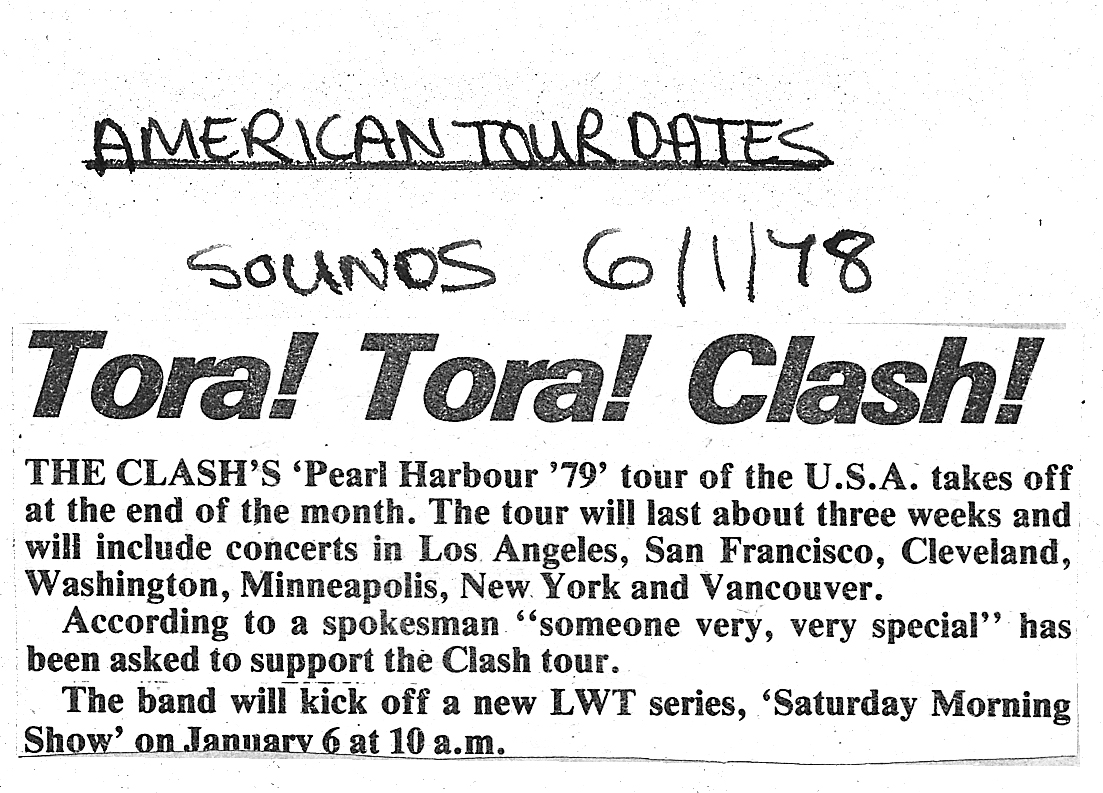
 Enlarge image
Enlarge image

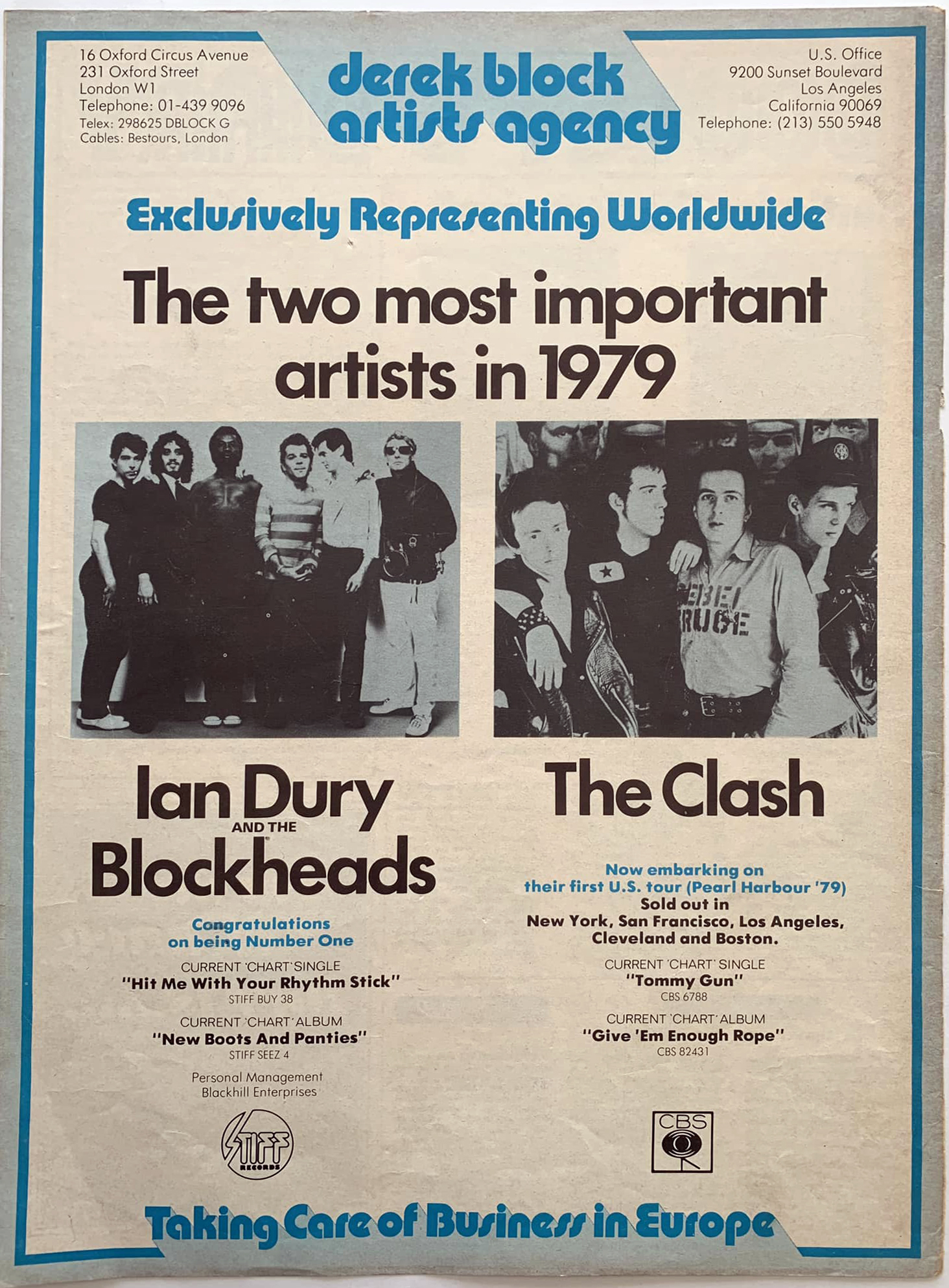
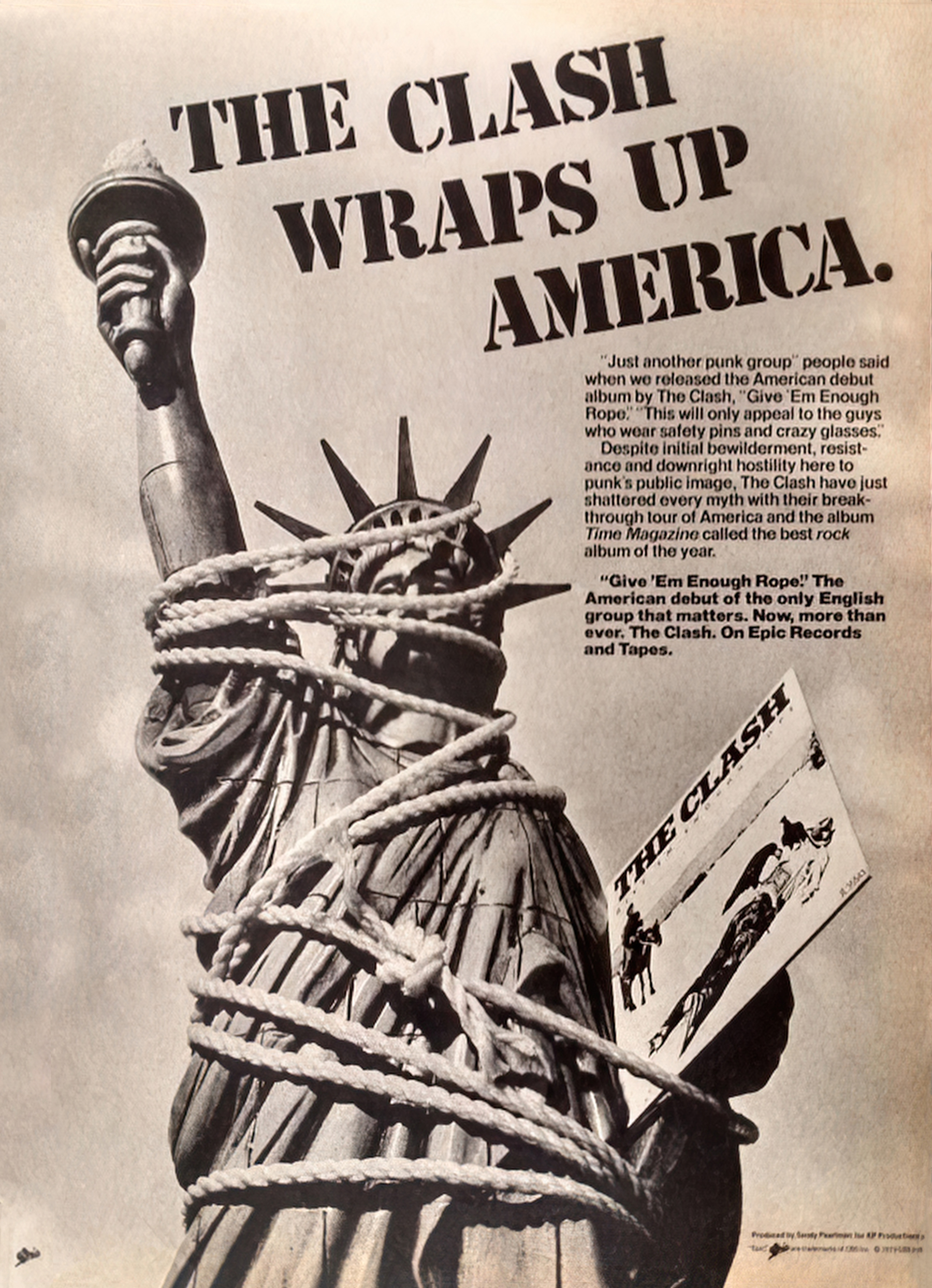

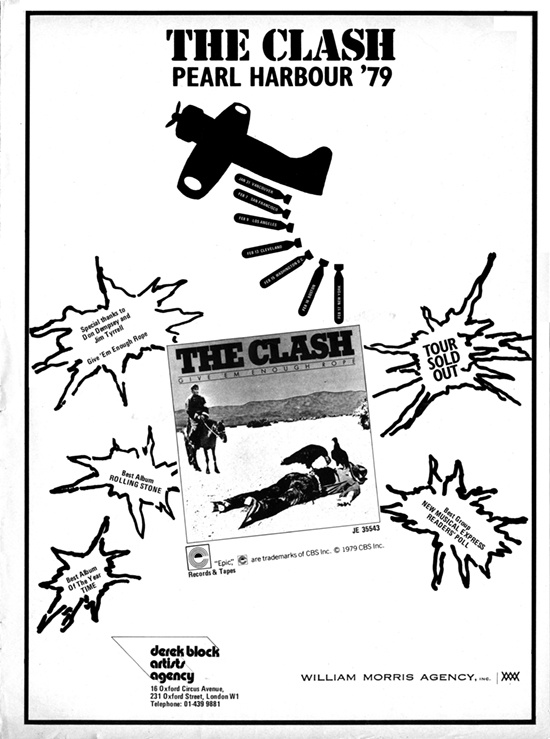
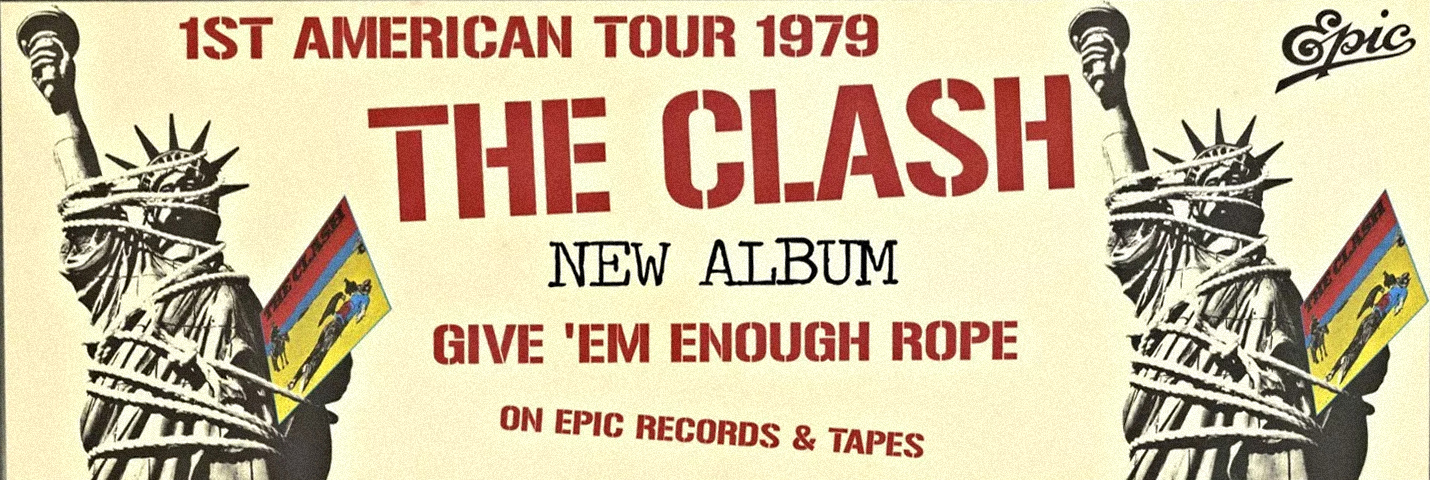

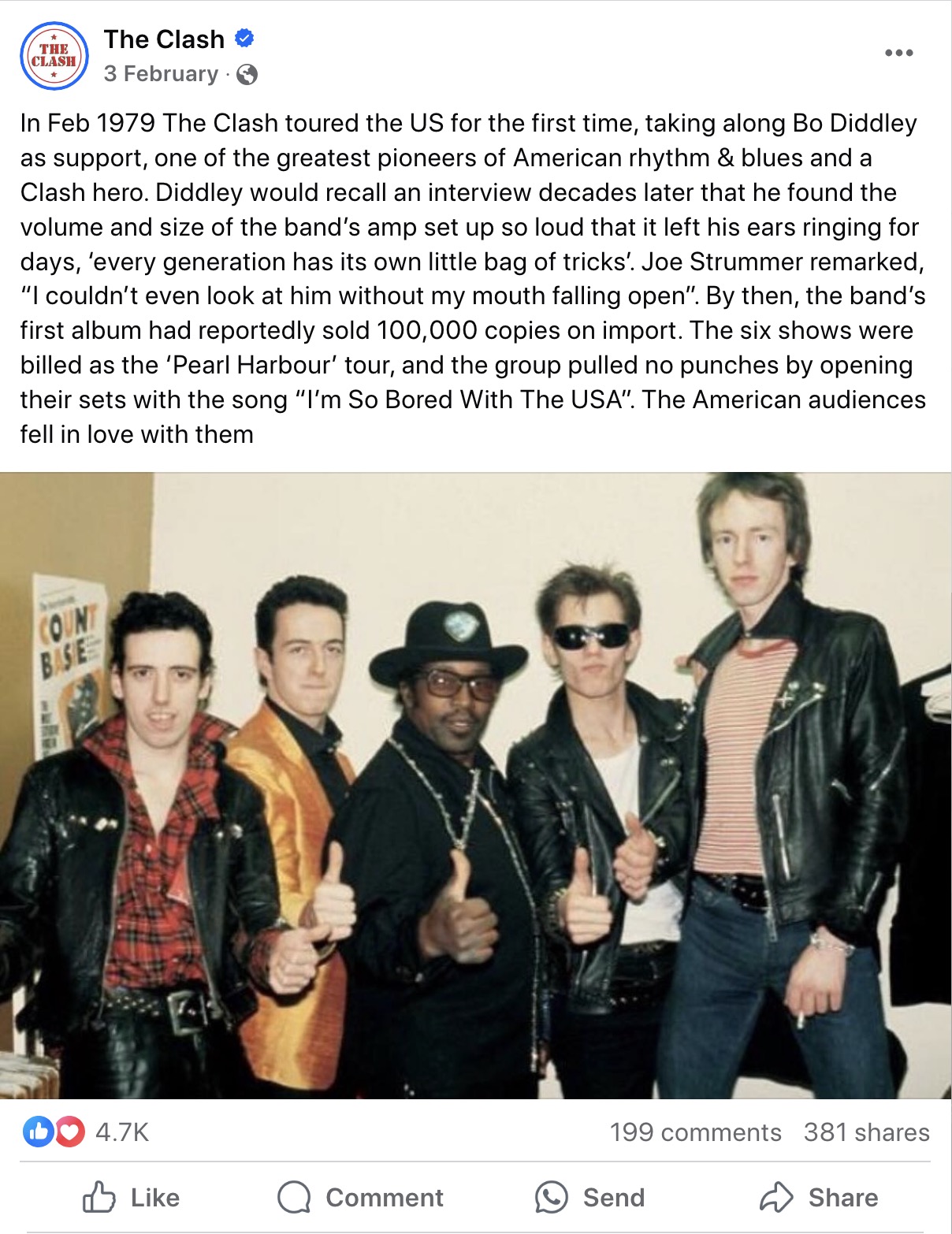
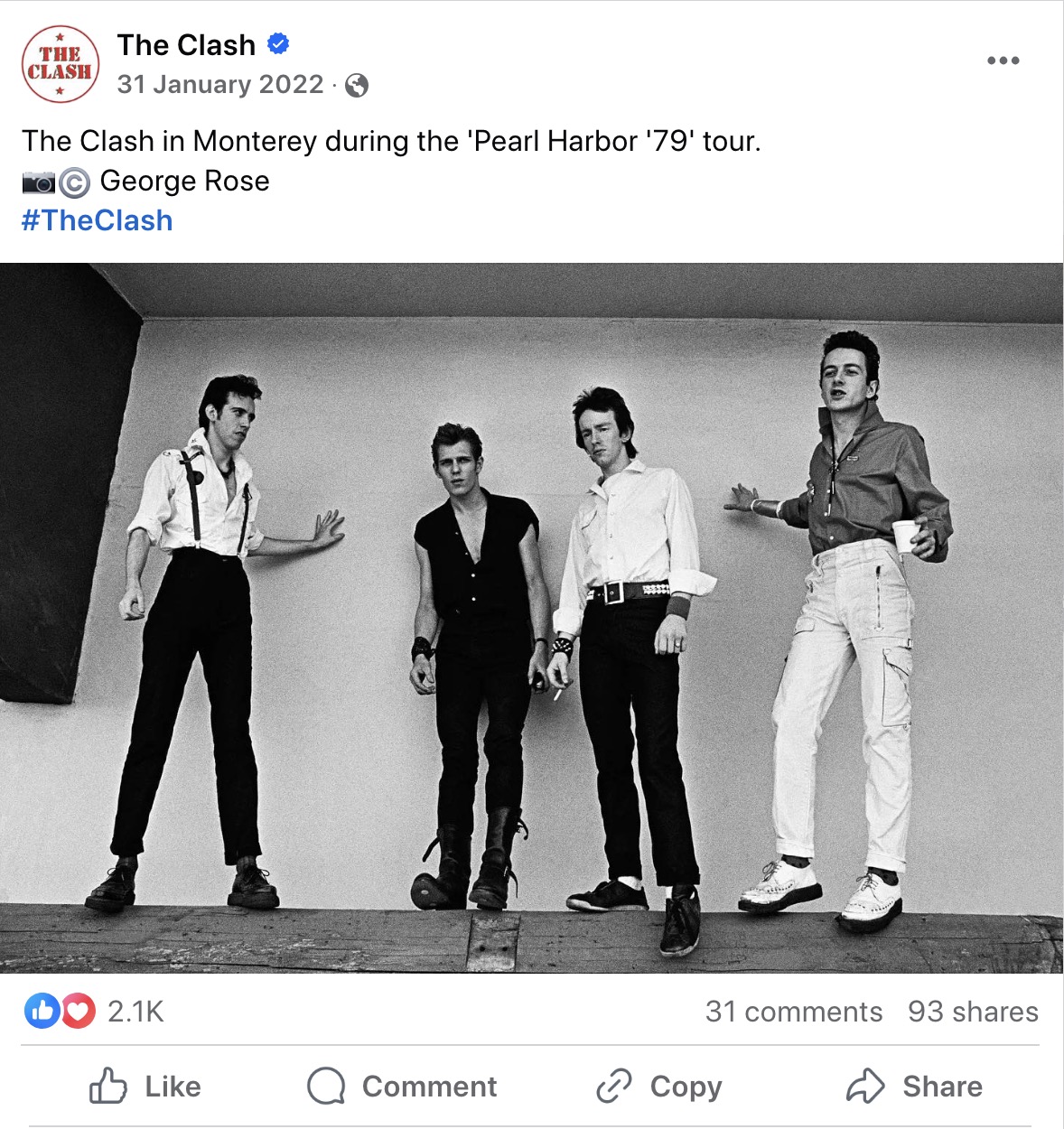

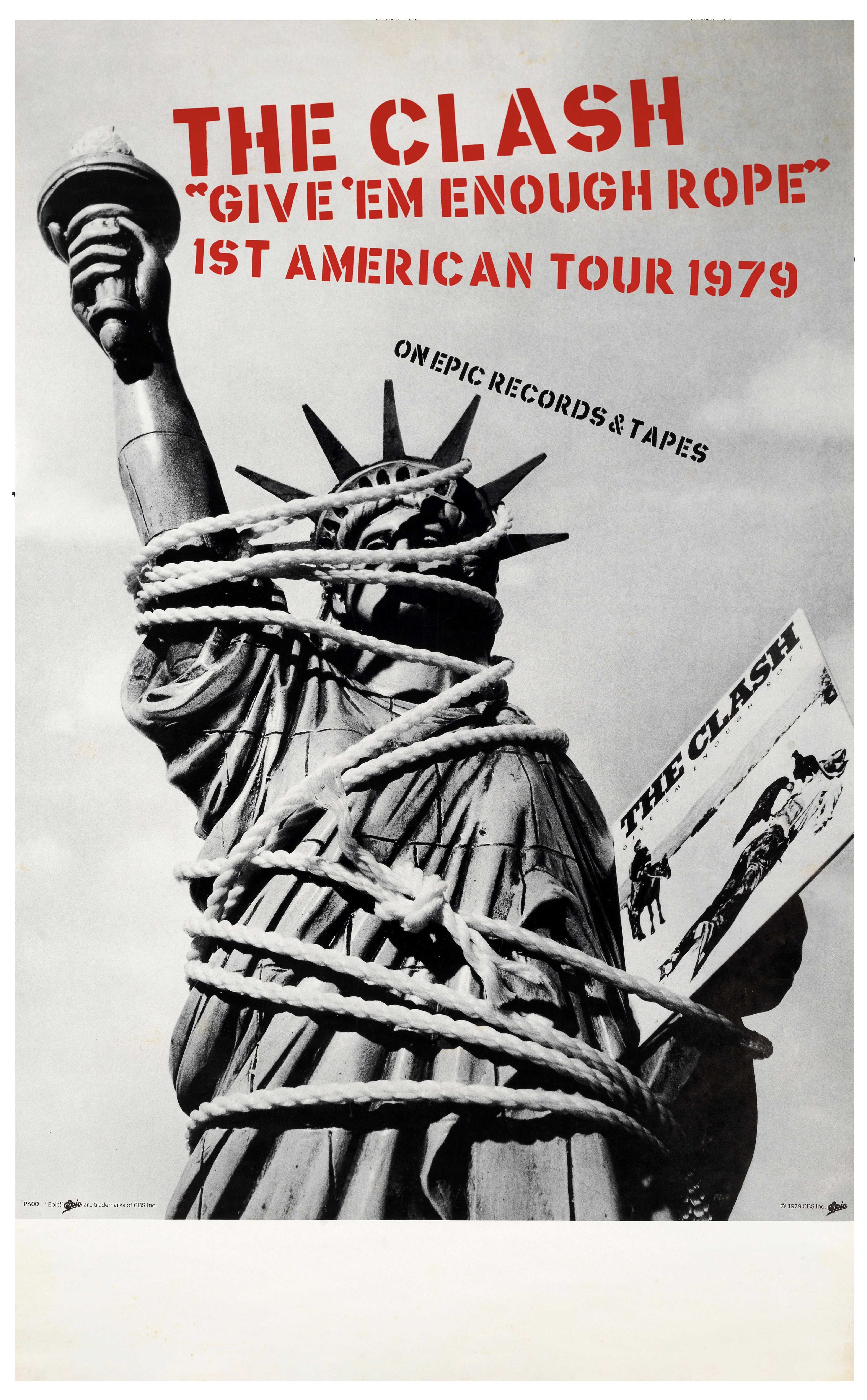
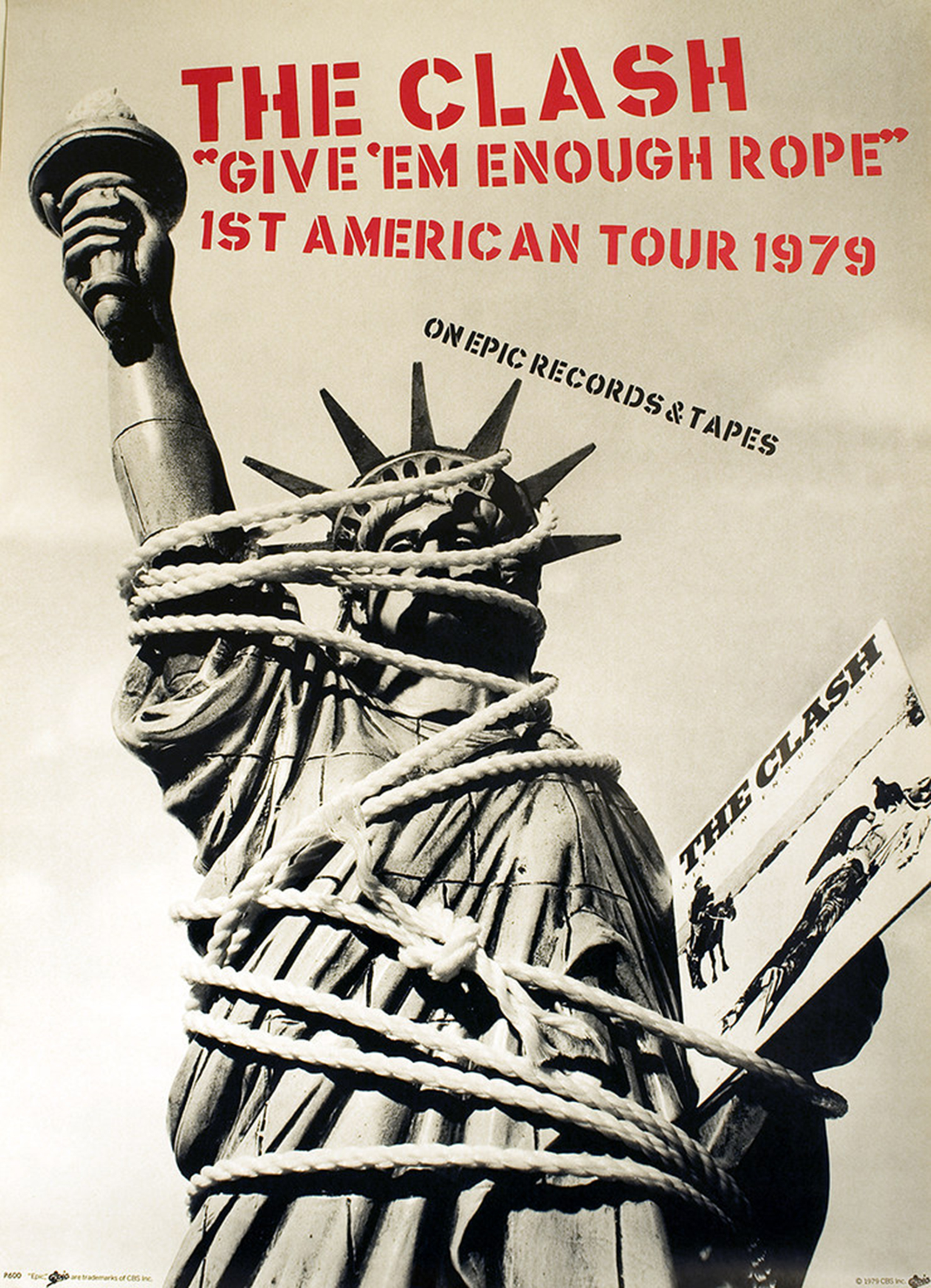
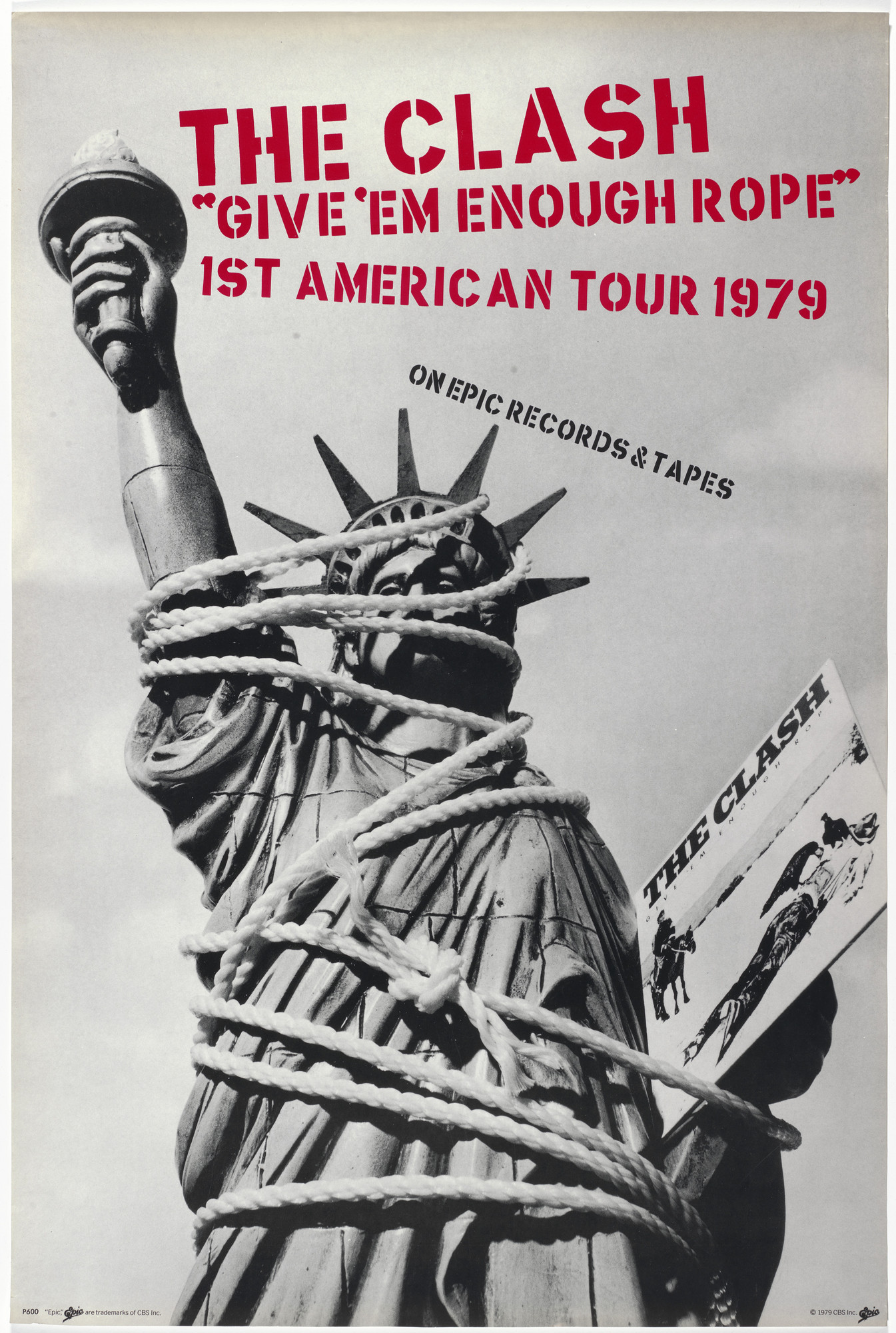
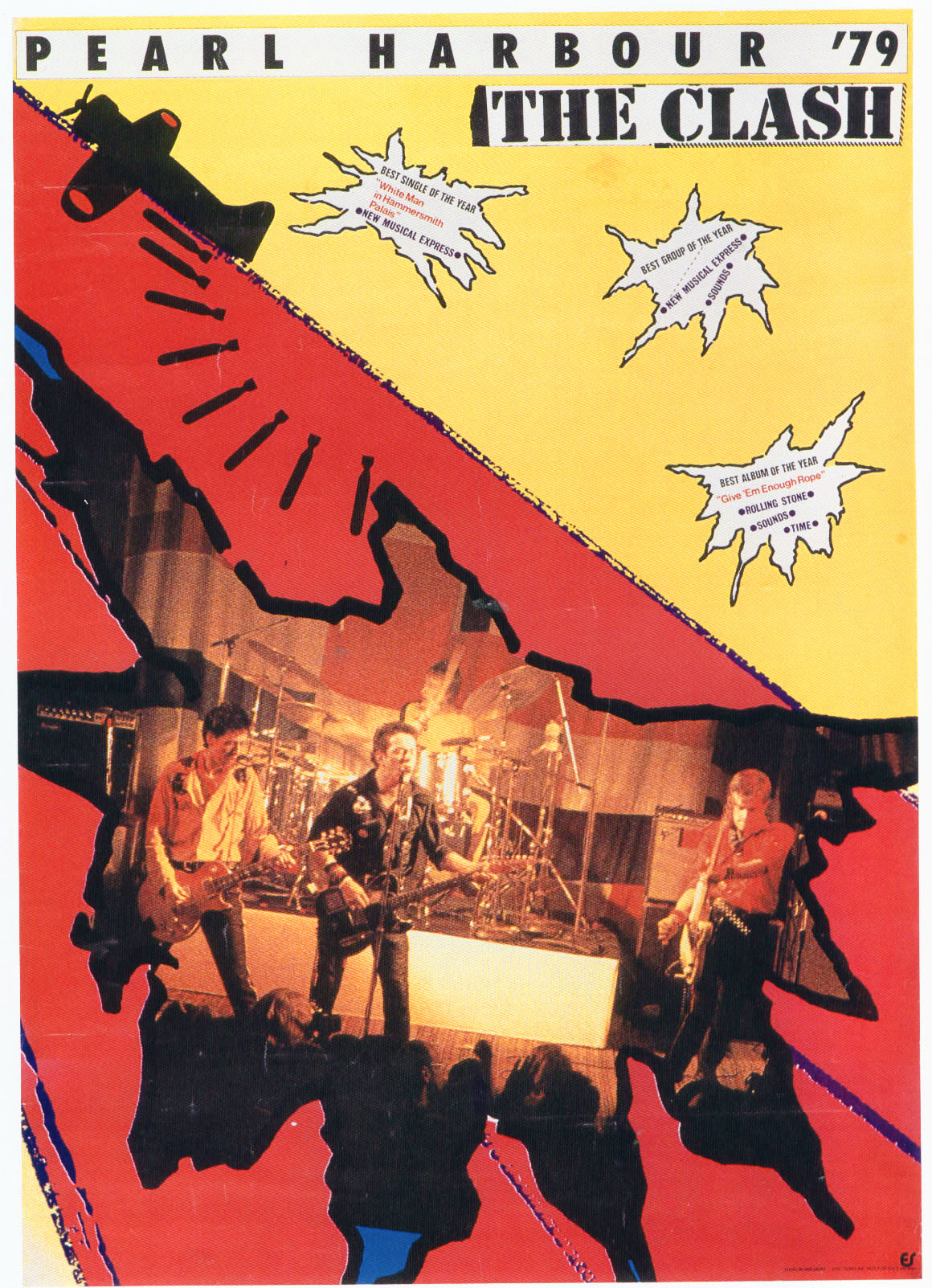
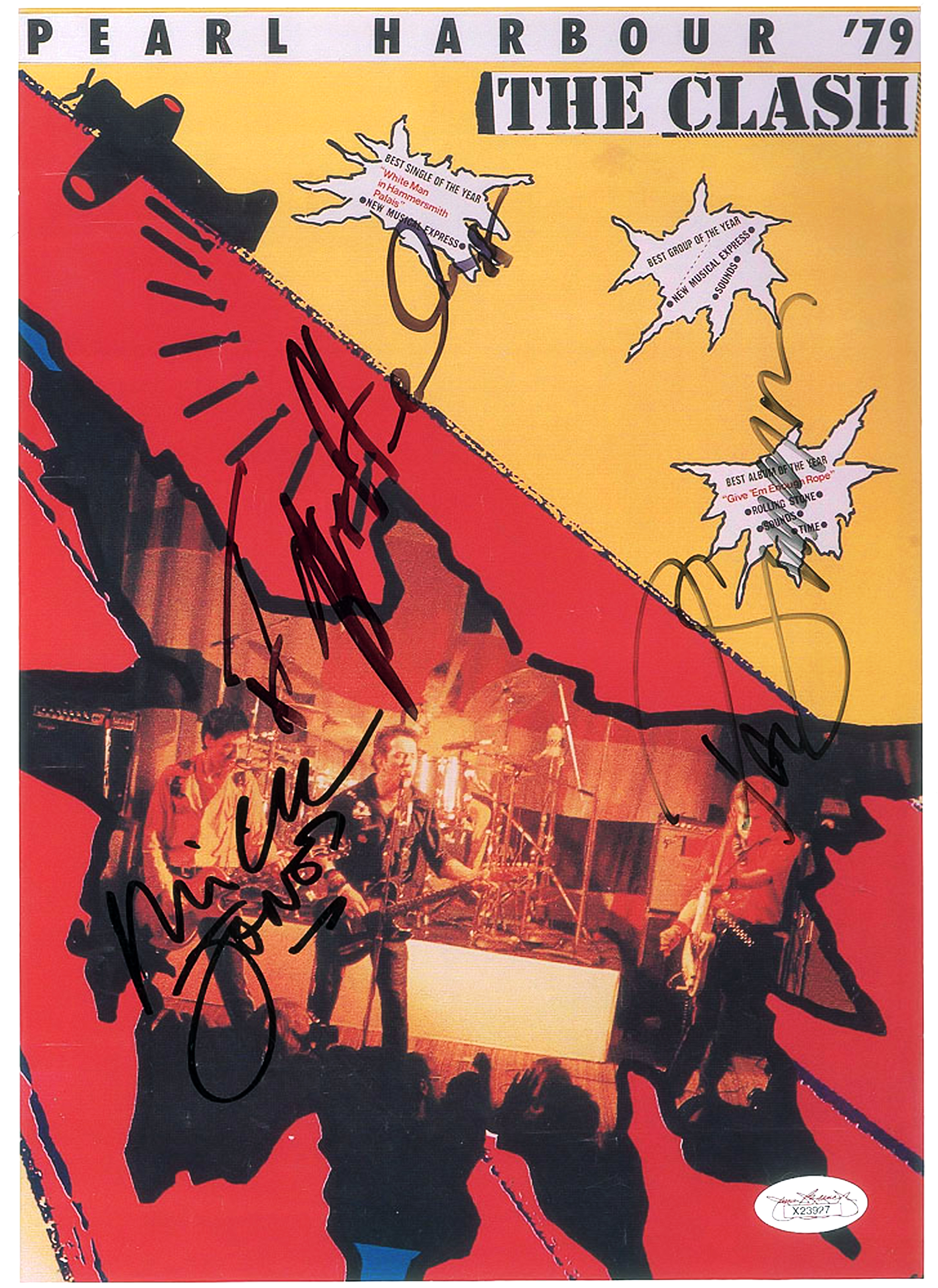

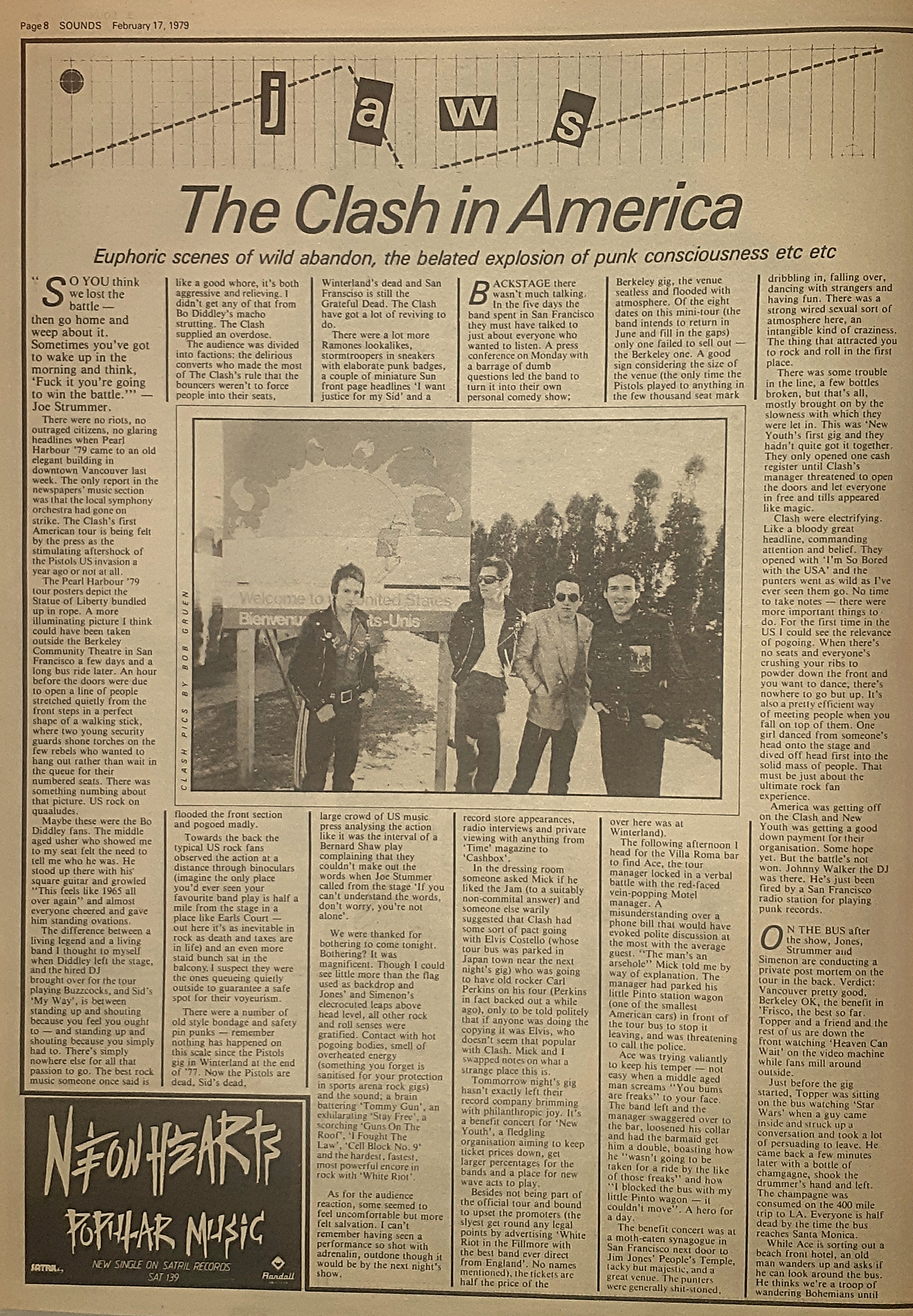





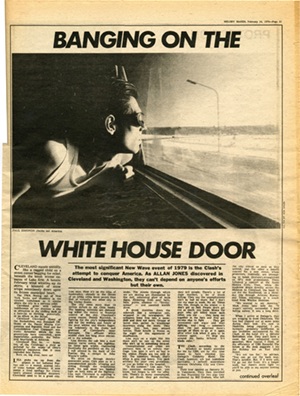

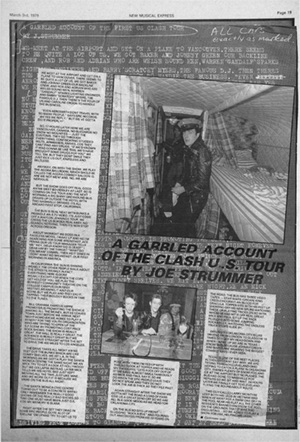
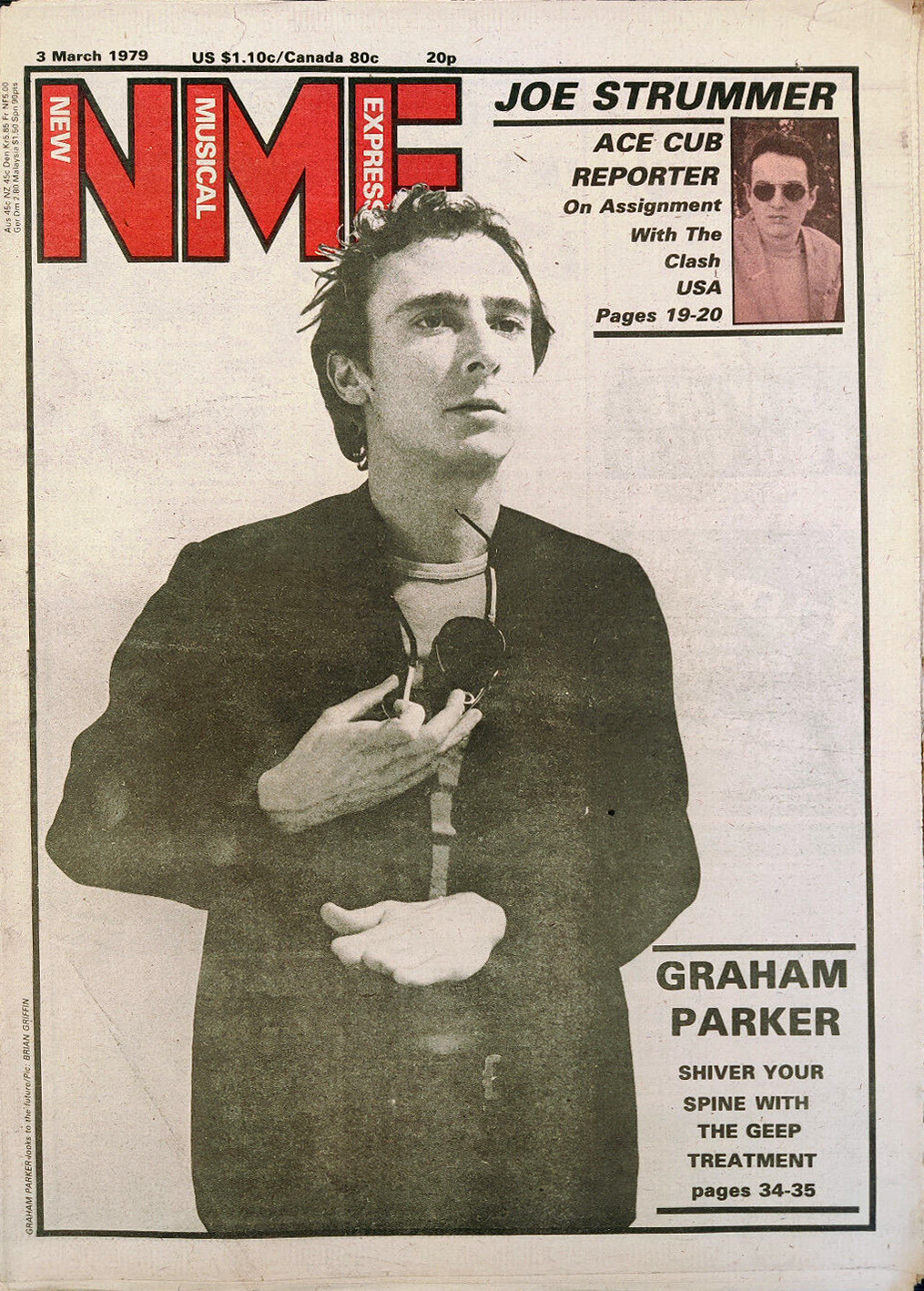












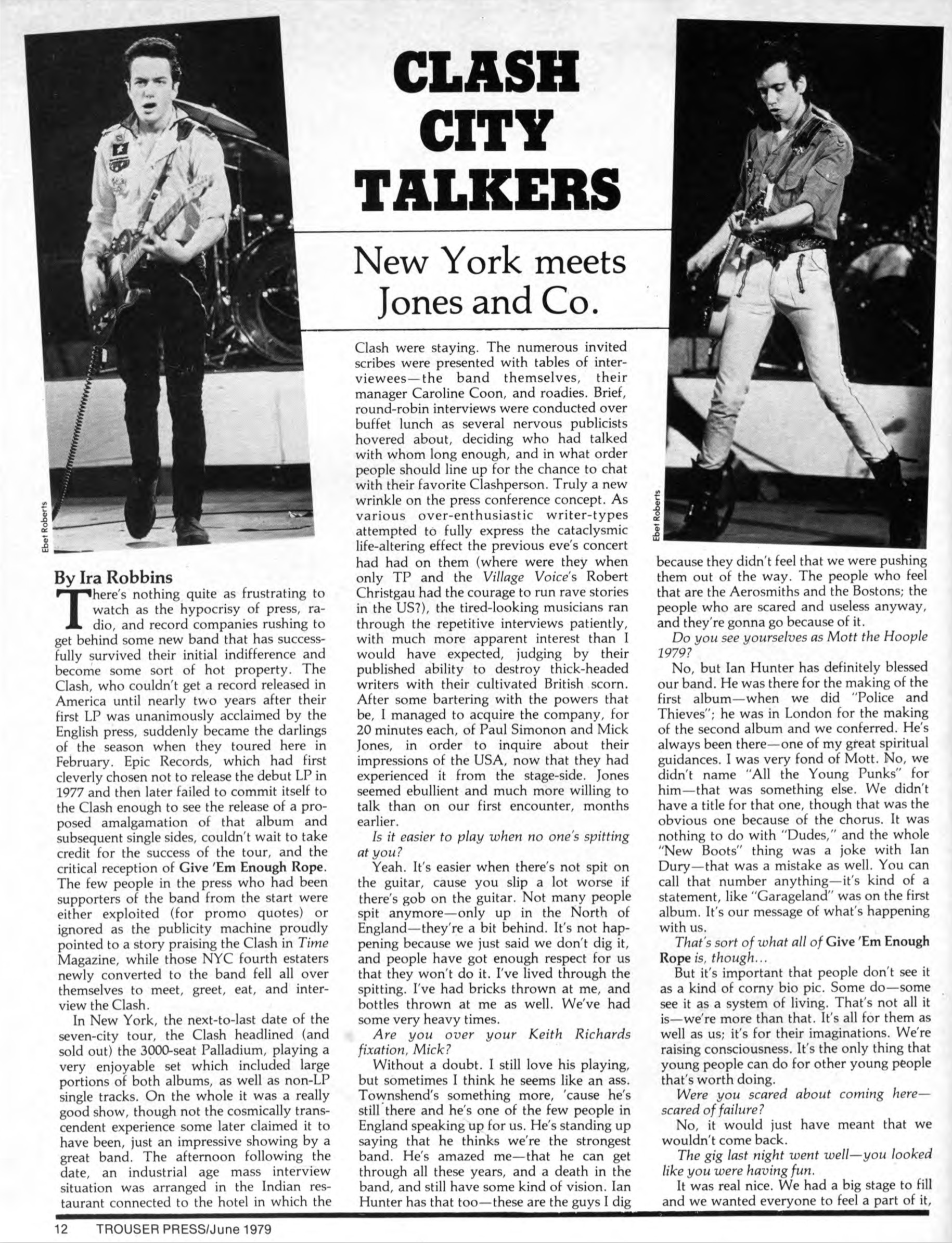
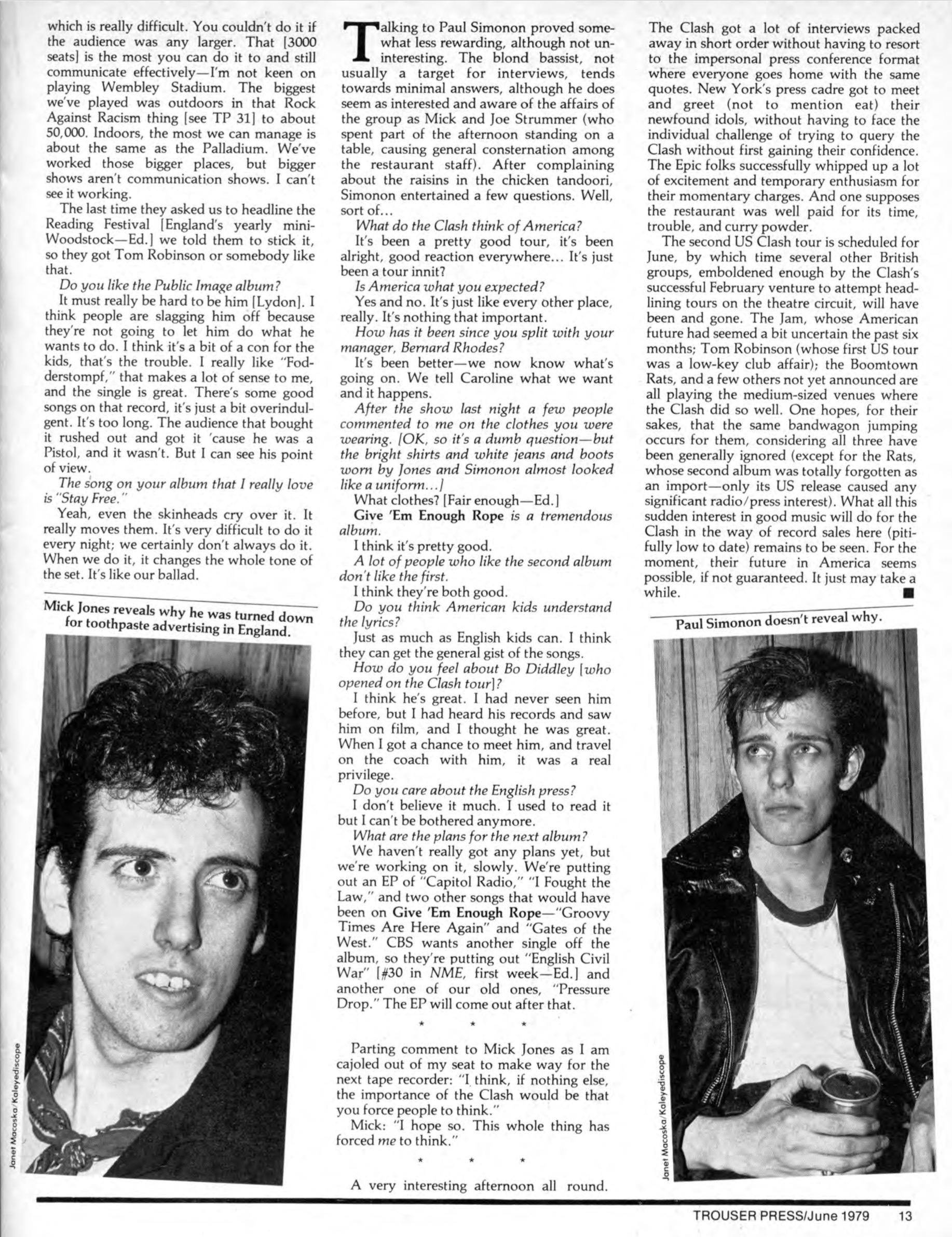
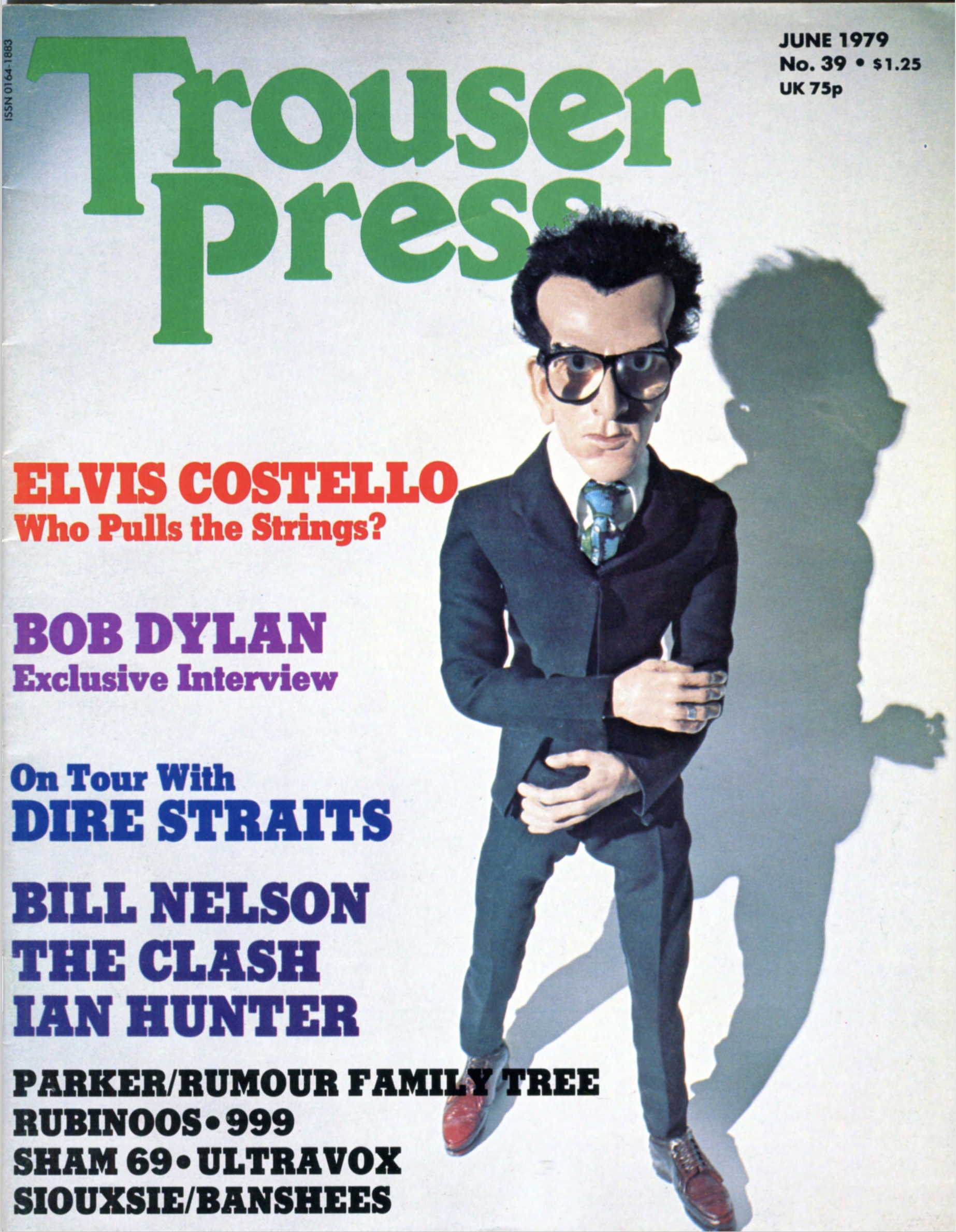





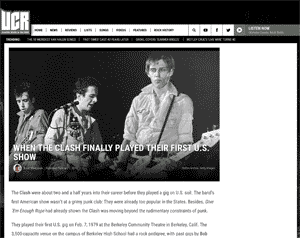



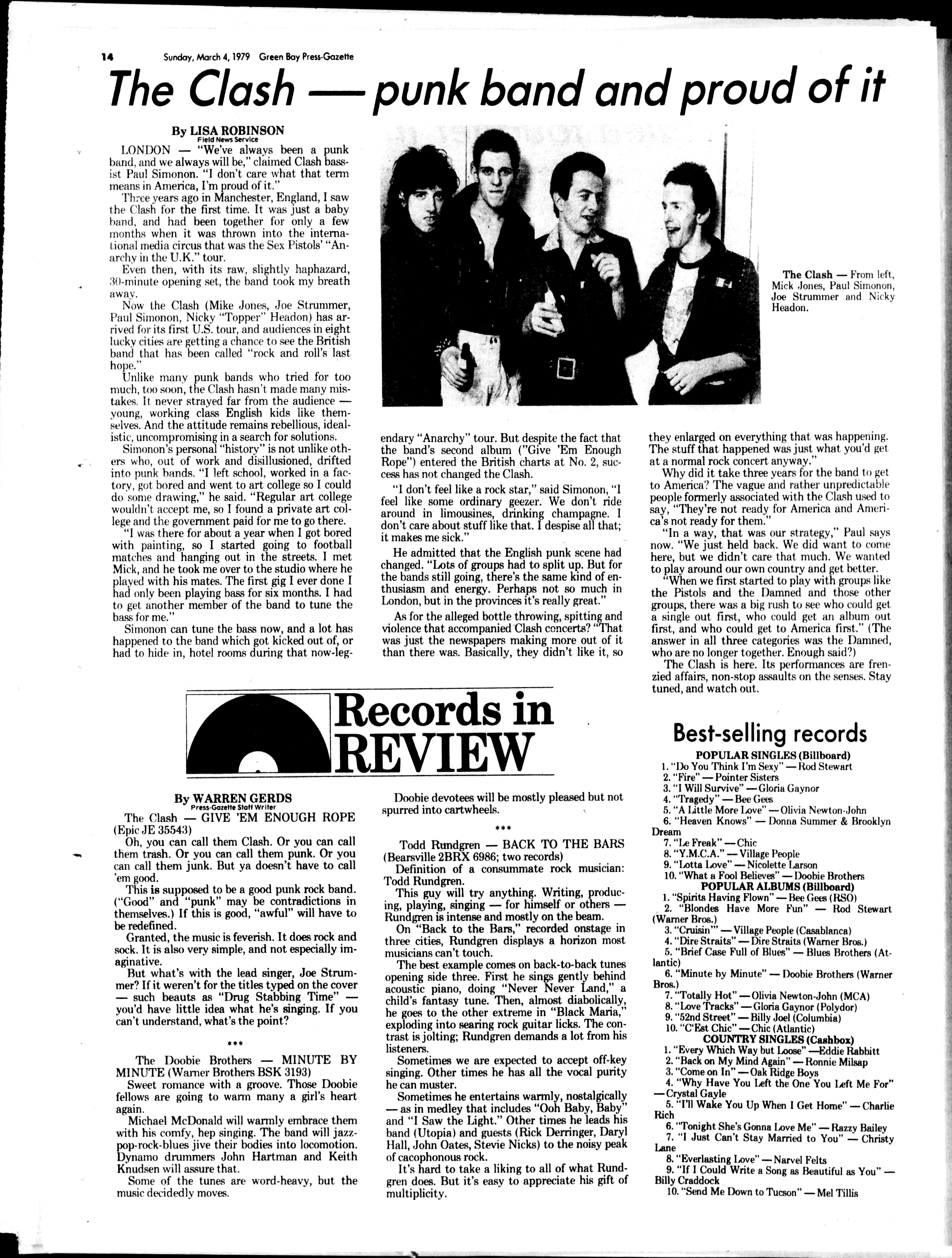

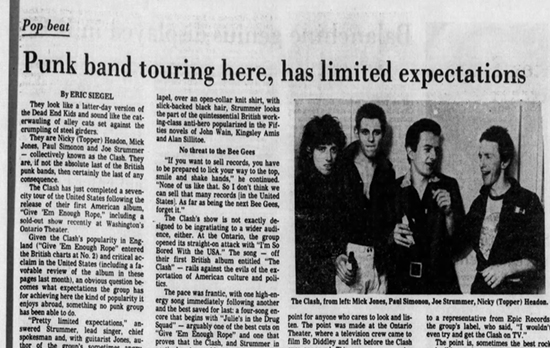
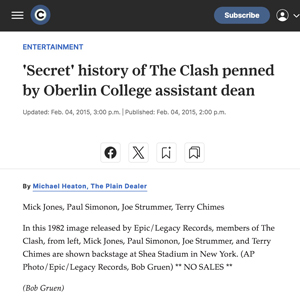 Doane also is the author of "Stealing All Transmissions: A Secret History of the Clash." The English punk band -- the classic lineup includes Joe Strummer, Mick Jones, Paul Simonon and Nicky "Topper" Headon -- became widely known as "The Only Band That Matters" in the 1980s, influenced a generation of musicians who followed and were inducted into the Rock and Roll Hall of Fame in 2003.
Doane also is the author of "Stealing All Transmissions: A Secret History of the Clash." The English punk band -- the classic lineup includes Joe Strummer, Mick Jones, Paul Simonon and Nicky "Topper" Headon -- became widely known as "The Only Band That Matters" in the 1980s, influenced a generation of musicians who followed and were inducted into the Rock and Roll Hall of Fame in 2003.

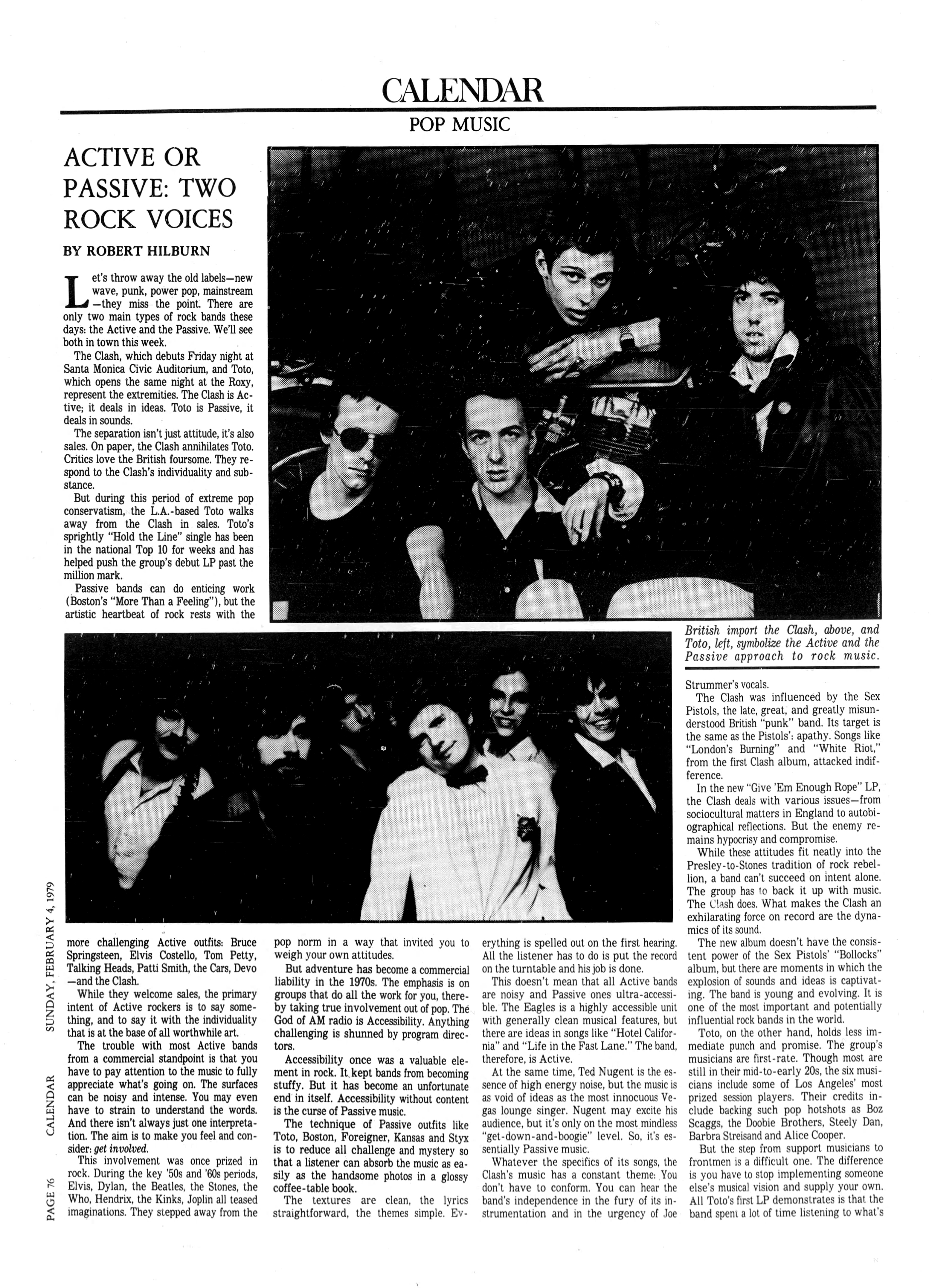
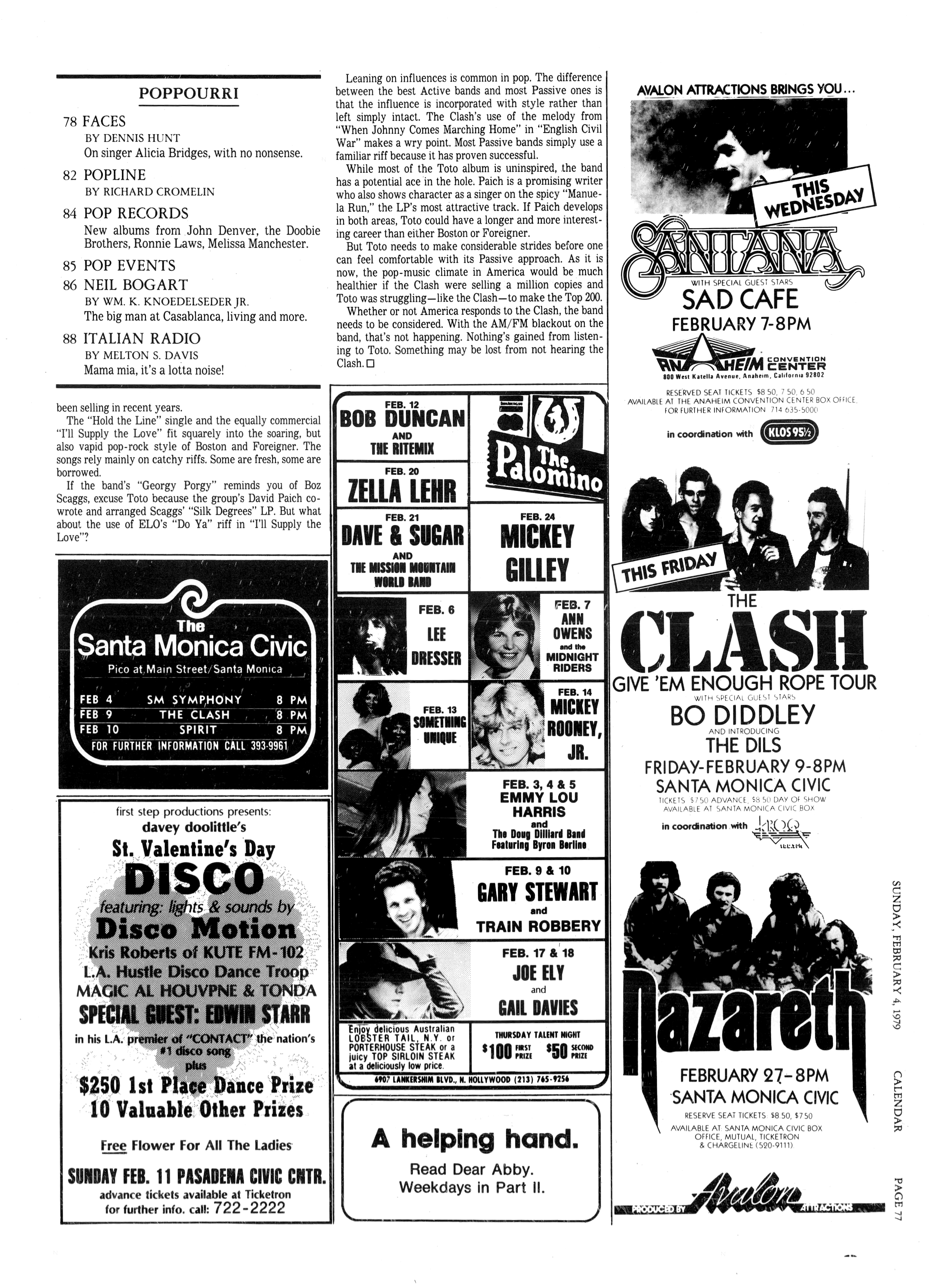

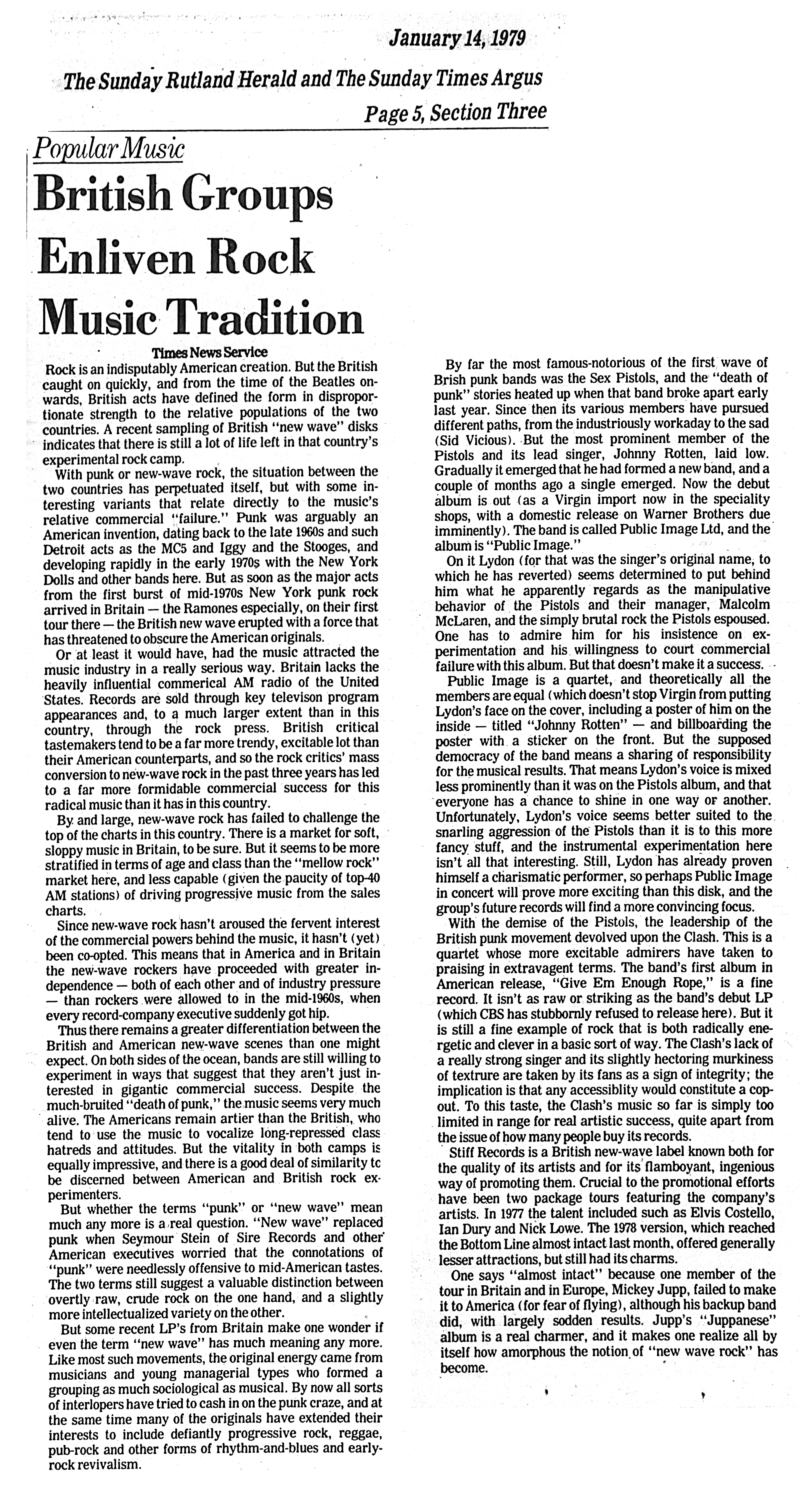


/Page%201%262%20550.jpg)



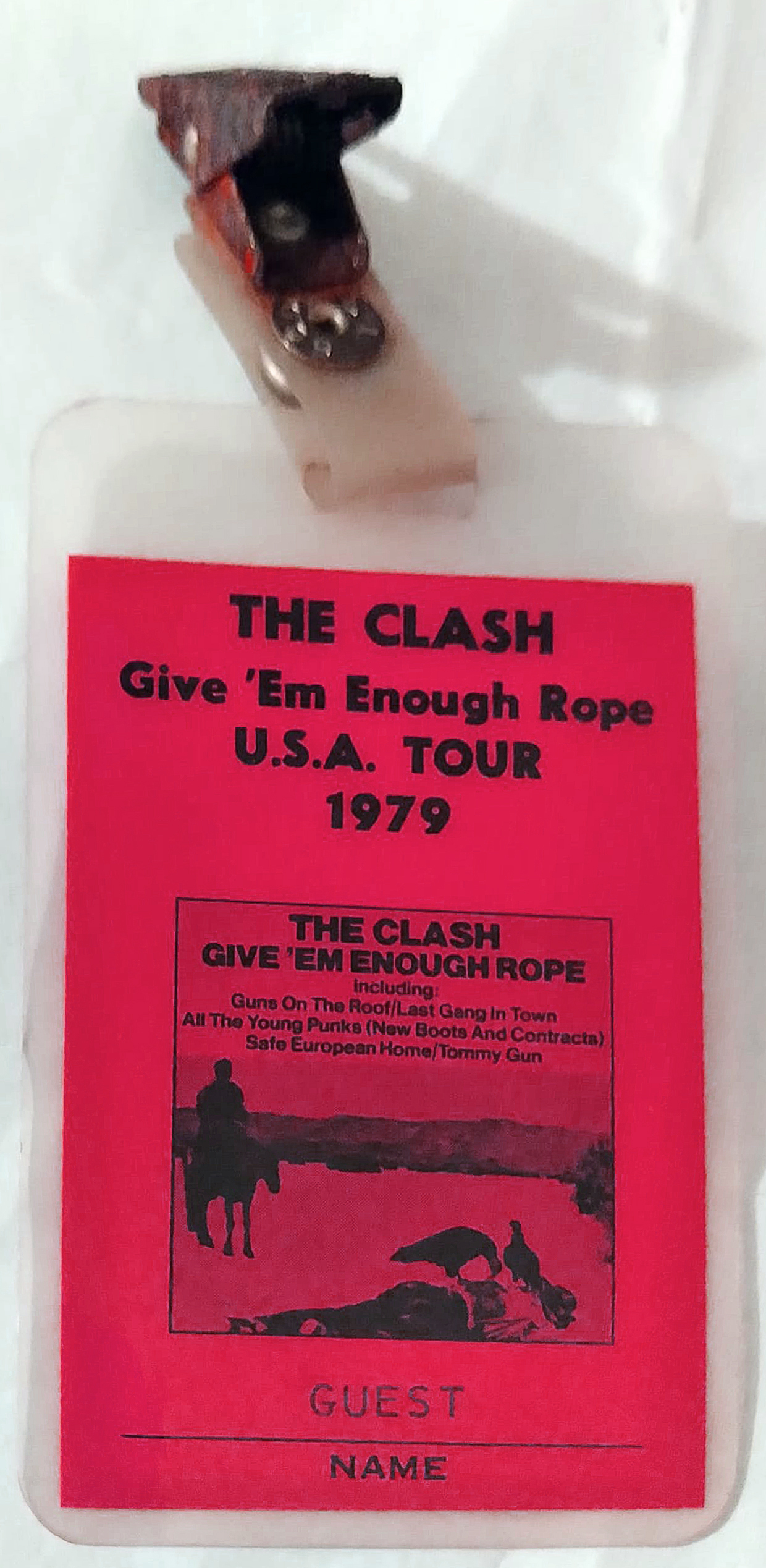

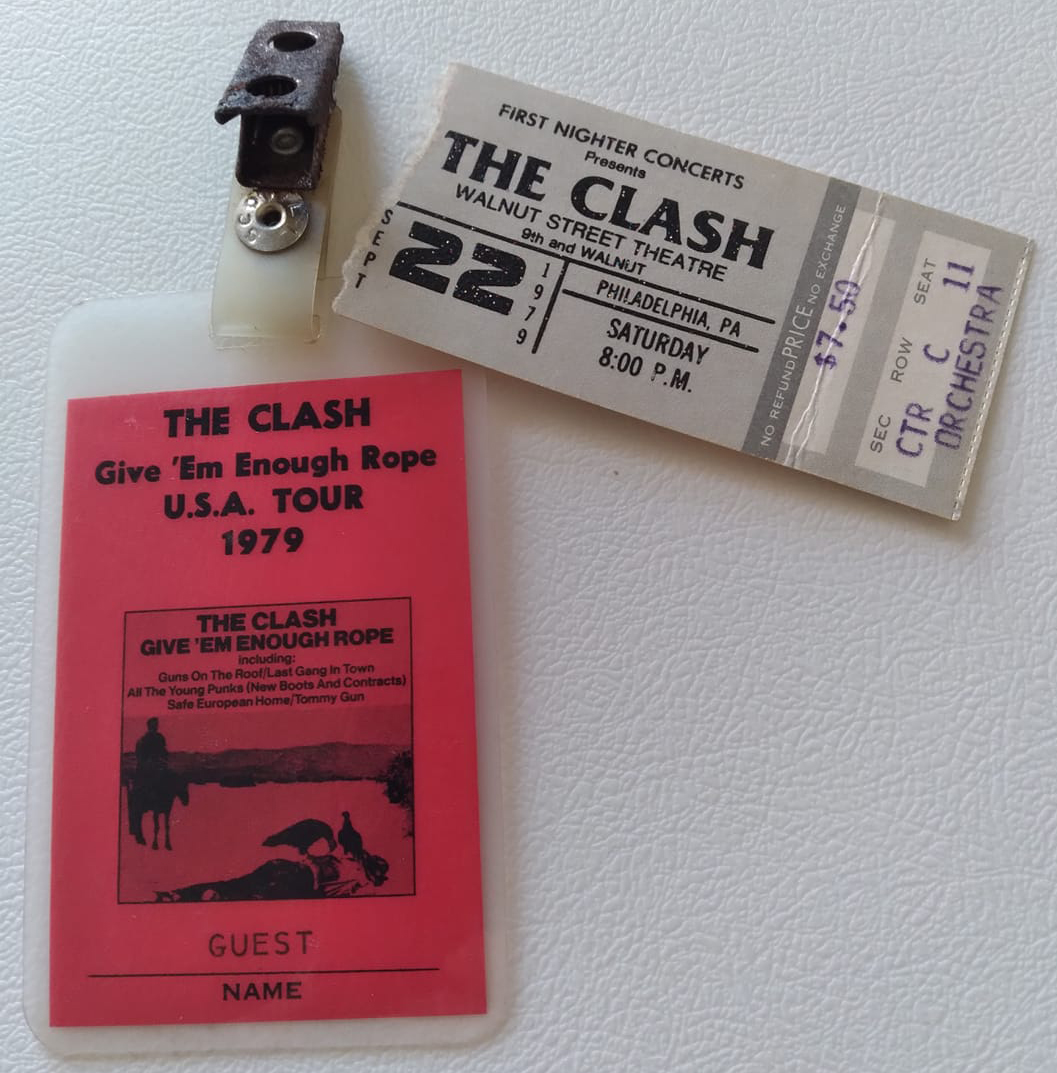

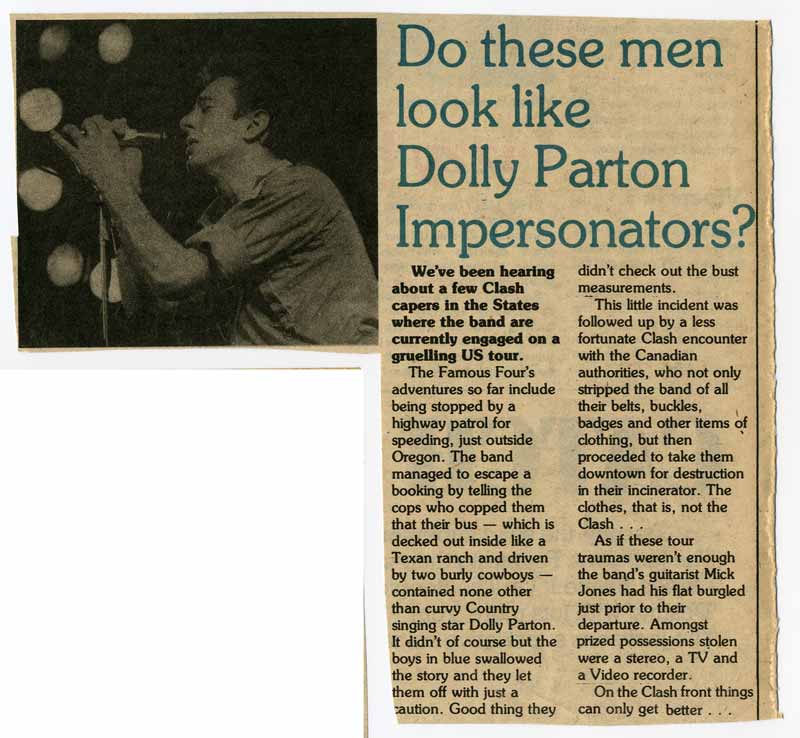

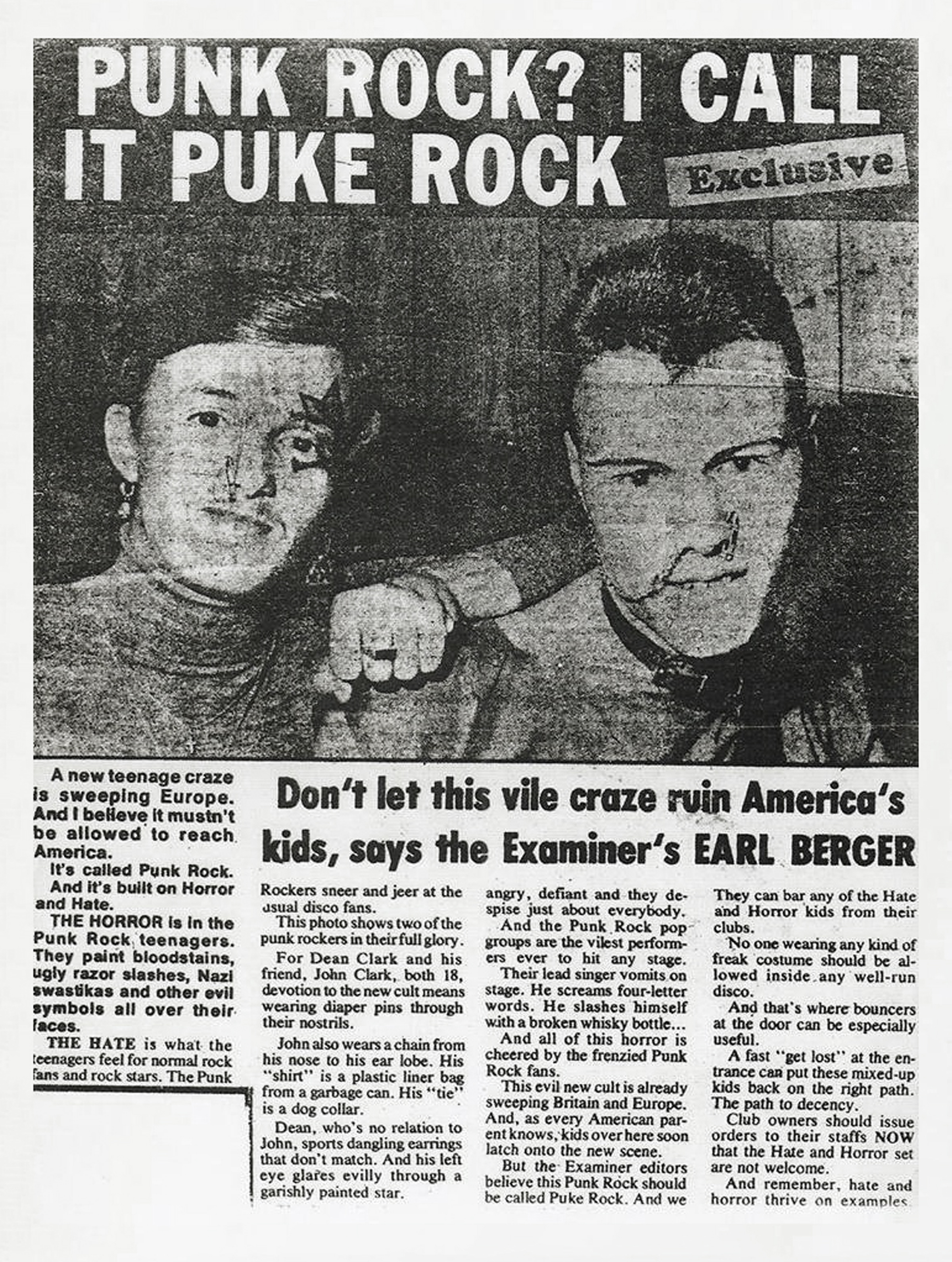




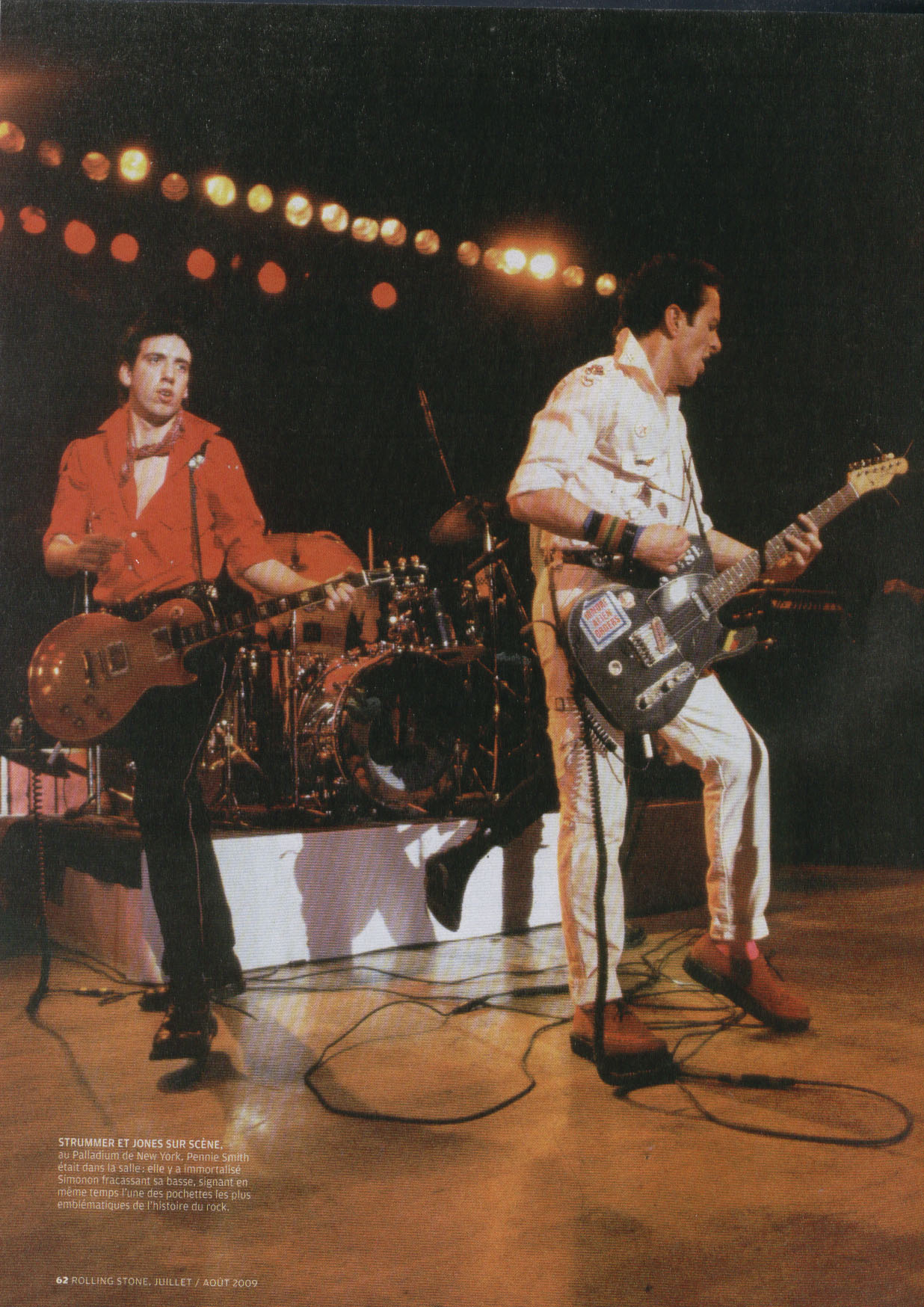
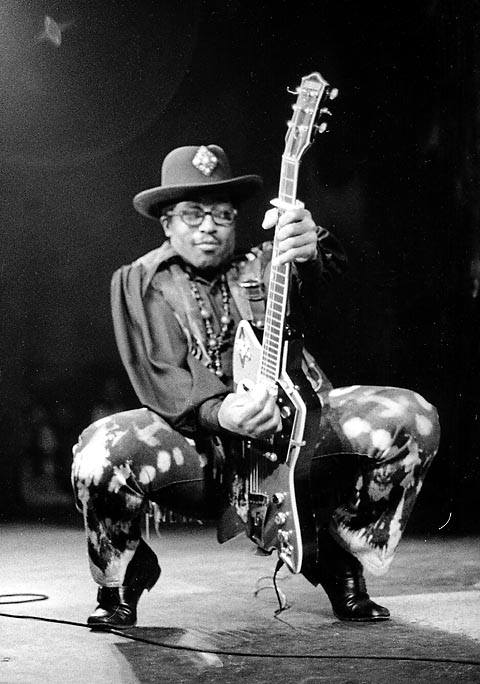
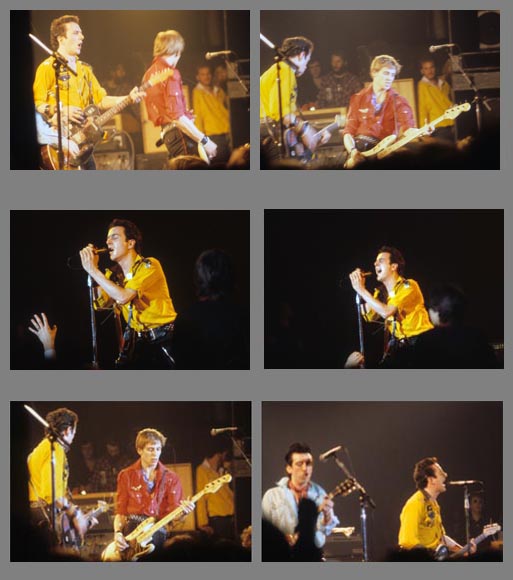
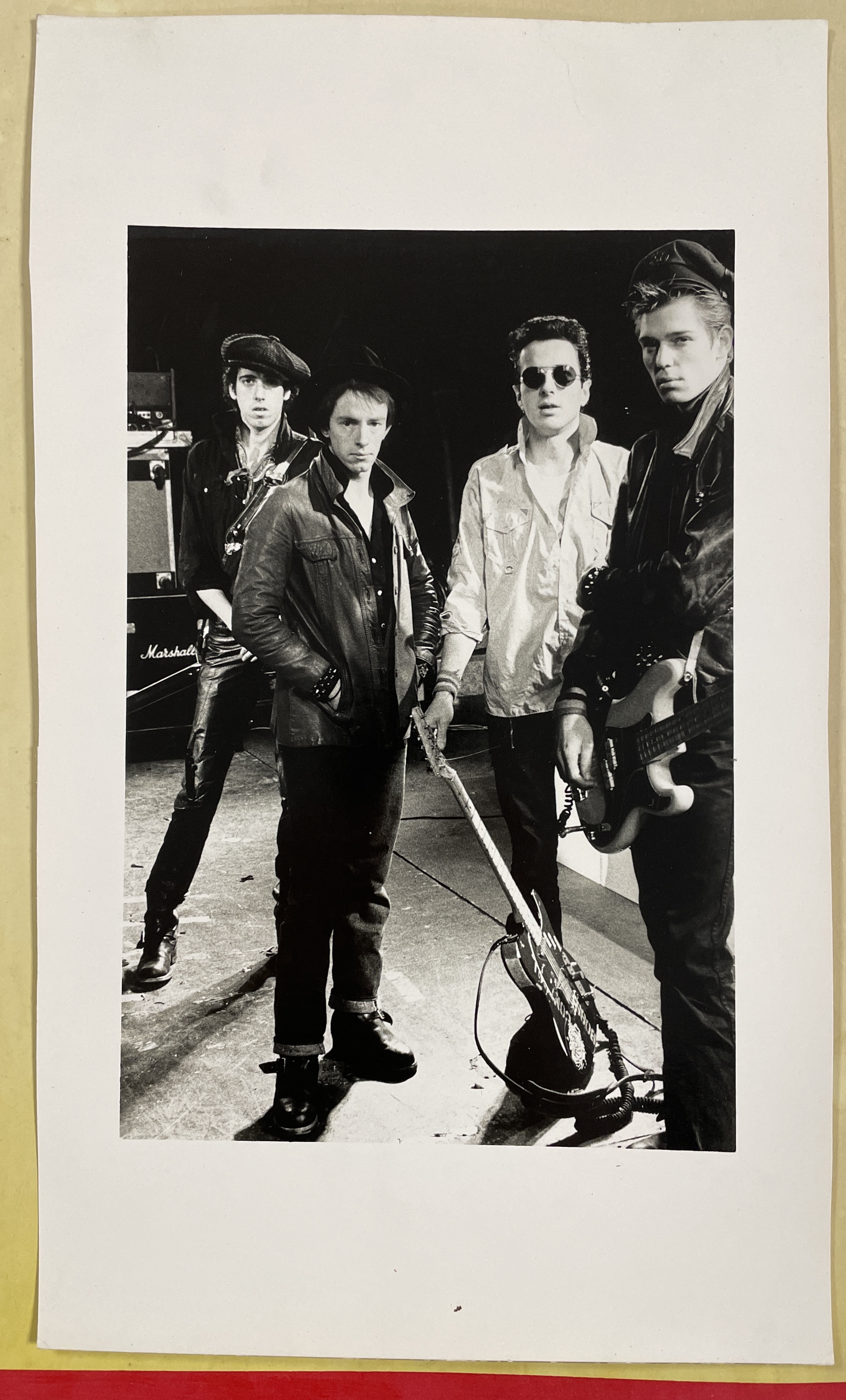

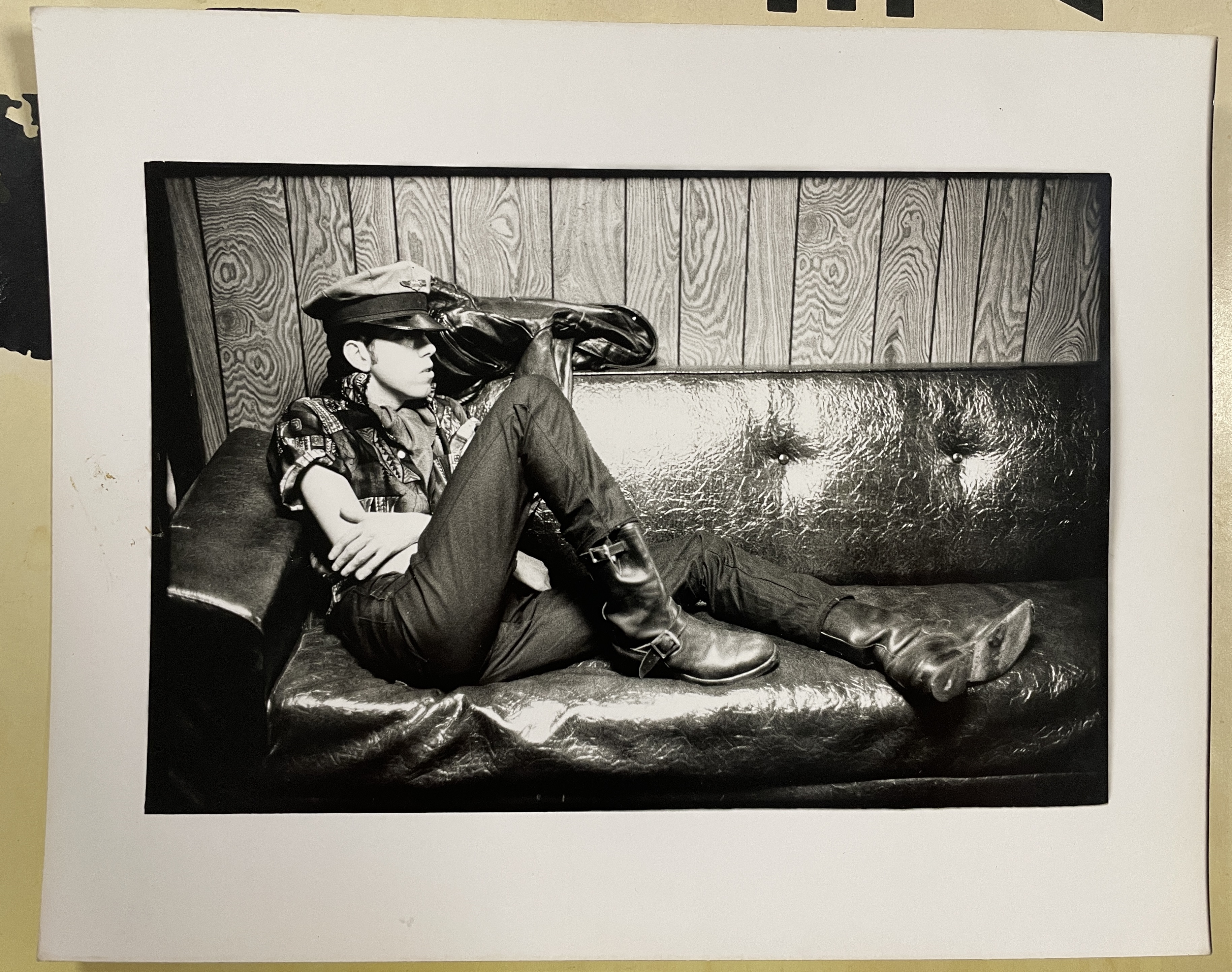

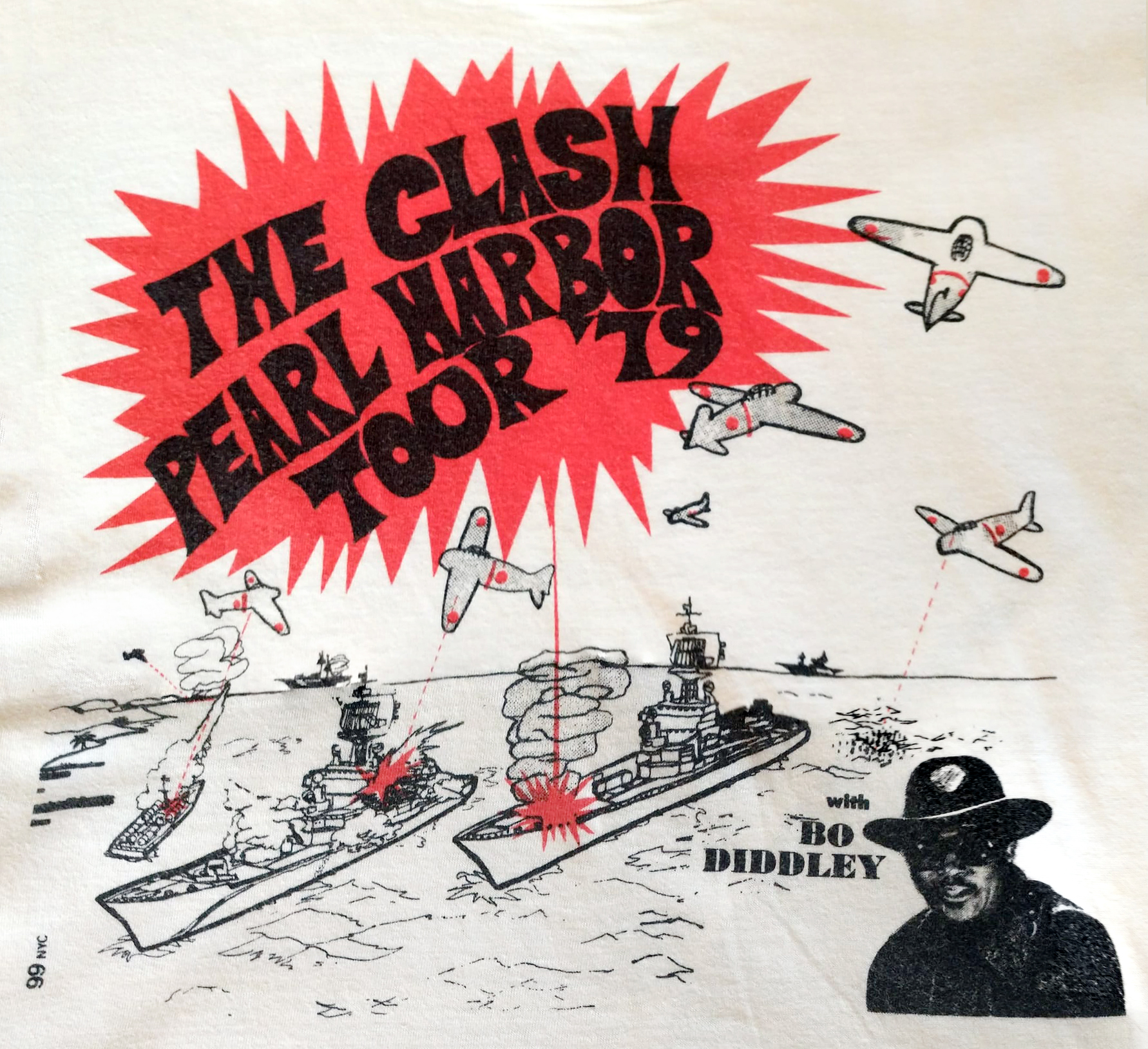



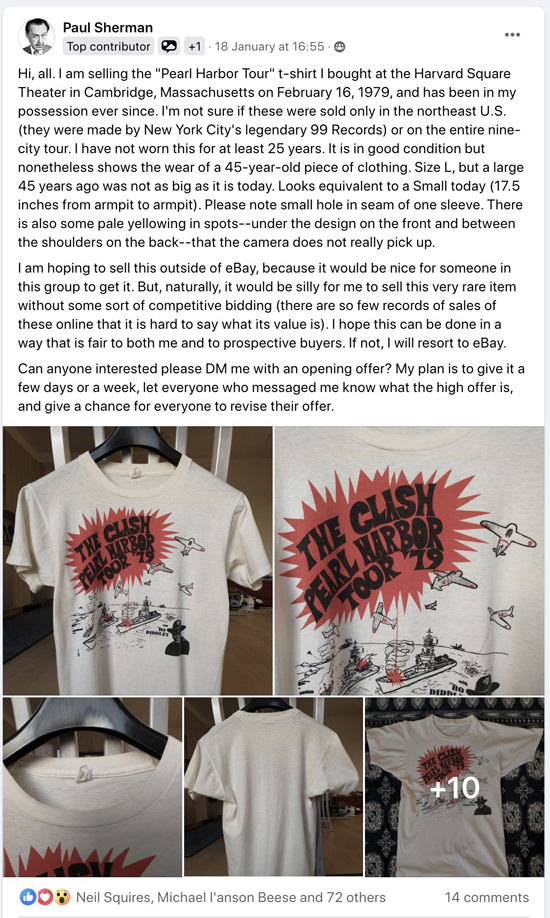

 Interview - Radio Vancouver
Interview - Radio Vancouver,%20JS%20int)/1.jpg)
,%20JS%20int)/2.jpg)






